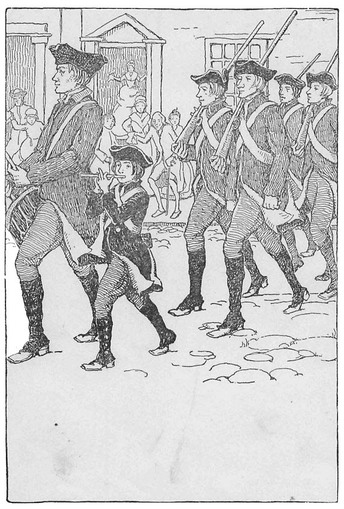
“THE YOUNGEST SOLDIER OF THE REVOLUTION”
The Project Gutenberg EBook of Boys and Girls of Colonial Days, by Carolyn Sherwin Bailey This eBook is for the use of anyone anywhere at no cost and with almost no restrictions whatsoever. You may copy it, give it away or re-use it under the terms of the Project Gutenberg License included with this eBook or online at www.gutenberg.org Title: Boys and Girls of Colonial Days Author: Carolyn Sherwin Bailey Illustrator: Uldine Shriver Release Date: November 11, 2012 [EBook #41348] Language: English Character set encoding: UTF-8 *** START OF THIS PROJECT GUTENBERG EBOOK BOYS AND GIRLS OF COLONIAL DAYS *** Produced by Roger Frank and the Online Distributed Proofreading Team at http://www.pgdp.net
Carolyn Sherwin Bailey

“THE YOUNGEST SOLDIER OF THE REVOLUTION”
BOYS AND GIRLS OF COLONIAL DAYS
BY
CAROLYN SHERWIN BAILEY
Author of
“What To Do for Uncle Sam,” “Boys and Girls
Of Pioneer Days” and other stories
Illustrated By
ULDENE SHRIVER
1925
A. FLANAGAN COMPANY
CHICAGO
COPYRIGHT, 1917, BY A. FLANAGAN COMPANY
PRINTED IN THE UNITED STATES OF AMERICA
CONTENTS
ILLUSTRATIONS
Boys and Girls of Colonial Days
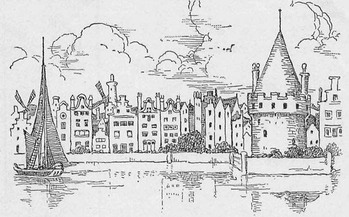
Peering over the edge of the boat rail, Love strained her weary, blue eyes for a glimpse of land. The sun, a ball of soft, gold light, showed now through the haze, and suddenly, like a fairy place the city appeared. There were tall, shining towers, gold church spires, pointed roofs with wide, red chimneys where the storks stood in one-legged fashion, and great windmills with their long arms stretched out to catch the four winds. Amsterdam, in Holland, it was, the haven of this little boat load of Pilgrims.
Love Bradford, ten years old, flaxen haired, and as winsome as an English rose in June, wrapped her long, gray cloak more closely about her and turned to one of the women.
“Do you think that my father may have taken another boat that sailed faster than this and is waiting for me on the shore, Mistress Brewster? The last words that he said to me when he left me on the ship were ‘Bide patiently until I come, Love; I will not be long.’ That was many days ago.”
Mistress Brewster turned away that the little girl might not see the tears that filled her eyes. Love’s father, just before the ship that bore the Pilgrims from England had sailed, had been cast into prison by the King, because of his faith. Love was all alone, but Mistress Brewster did not want her to know of her father’s fate.
“Perhaps your father will meet you some day soon in Holland. Surely, if he said that he would not be long, he will keep his word. See, Love, see the little boy of your own age down there in the fishing boat.”
Love looked in the direction in which the woman pointed. A plump, rosy little boy with eyes as blue as Love’s own and dressed in full brown trousers and clumsy wooden shoes sat on a big net in one end of the boat. He looked up as the sails of the little fishing craft brought it alongside the boat that bore the wanderers from England. At first he dropped his eyes in shyness at sight of the little girl. Then he lifted them again and, as his eyes met hers, the two children smiled at each other. It was like a flash of sunshine piercing the gray haze that hung over the sea.
There were friends waiting on the shore for all save Love. Older brothers these were, fathers and other relatives who had made the pilgrimage from England a few months before and had homes ready for them all. They climbed a long hill, very flat on the top, and reached by a flight of steps. Then they were as high as the trees that lined the beach and could look over the narrow streets, the tidy cottages with their red roofs, and the pretty gardens. There were many little canals, like blue ribbons, cutting the green fields.
“Welcome to Amsterdam!” said a Dutch housewife, in wide white cap and apron, who met them. She put her hand on Love’s yellow hair. “And in which house are you going to live, little English blossom?” she asked kindly.
Love looked up wonderingly into her face and there was a whispered consultation between Mistress Brewster and the Amsterdam woman. “Poor little blossom! She shall come home with me. There is always room for one more in the stork’s nest,” the Dutch woman said kindly. She took Love’s hand and led her away from the others, and along the canal.
The house where they stopped was very odd indeed. It was made of red and yellow bricks and it stood on great posts sunk deep into the ground. Opening the white door that fairly shone, it was so clean, they were in the kitchen. Such a kitchen it was, so cosy and so quaint! The floor was made of white tiles and there was a queer little fireplace. It looked like a big brass pan filled with coals, and there was a shining copper kettle hung over it by a chain from the ceiling. The kettle bubbled and sang a cheerful welcome to Love. There were stiff white curtains at the windows and, on the sill of one, was a row of blossoming plants. Blue and white dishes and a pair of tall candlesticks stood on a shelf. Love could see a bright sitting room beyond and another room where there was a strange bed built in the wall, and stretching almost from the floor to the ceiling.
“Jan, Jan,” the woman called. “Come in from the garden and offer your new little English sister a seed cake. You may have one yourself, too. You have long wished for a playmate and here is one come to live in the house with you.”
The door opened slowly and in came Jan. He did not look up at first. Then his eyes caught Love’s. It was the little boy of the fishing boat. His dear mother it was who had offered to take care of lonely little Love.
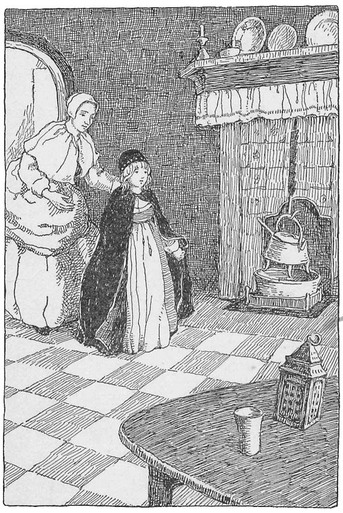
“THE KETTLE BUBBLED AND SANG A CHEERFUL WELCOME TO LOVE”
“You may help me drive the dogs that draw the milk wagon,” Jan said to Love the next morning after they had become very well acquainted over their breakfast of milk and oatmeal cakes.
“And so I can help to earn money for your kind mother,” Love said with shining eyes.
Jan had two dogs and a little two-wheeled cart to which he harnessed them every morning. Into the cart his mother put two shining pails of milk and a long handled dipper for measuring. To-day she put in some round, white cheeses and golden balls of butter. Off started the cart along the narrow street with Love running gaily along one side and Jan clattering along in his wooden shoes on the other side. The dogs knew where to stop almost as well as Jan did for they had made the trip so many times. The cheese and butter were soon gone, and every one had a pleasant smile for the little English lass. At one cottage, a Dutch housewife brought out a strange, earth-colored bulb that she put in Love’s hands. Then, smiling down into the little girl’s wondering face, she said:
“It is a rare one indeed. I give it to you that you may plant it and tend it all winter. When the spring comes, you will have a finer one than any child in all Amsterdam.”
Love thanked the woman but she puzzled over the hard, dry bulb as she and Jan walked home beside the empty milk cart. “It looks like nothing but an onion. What good is it, Jan?”
Jan’s eyes twinkled. “I know, but I won’t tell,” he said. “I want you to be surprised next spring. Come, Love, we will plant it in the corner of the garden that the sun shines on first in the spring. Then we will wait.”
As Jan dug a hole and Love planted the bulb, his words repeated themselves in the little girl’s lonely heart. She remembered, too, what her dear father had said last to her, “Wait patiently until I come, Love.” Would her patience bring the hard bulb to life or her father back, Love wondered sorrowfully.
The days passed, with blue skies and the bright sun shining down upon the canal, and then grew shorter. The storks flew south, and Love was very happy. Her days with Jan were busy, merry ones. She, too, had wooden shoes now; and Jan’s mother had made her a warm red skirt and a velvet girdle and a little, green, quilted coat. Love looked like a real little Dutch girl as she skated to school, with her knitting in her school bag to busy her fingers with when it was recess time.
There was never any place in England, Love thought, so merry and gay as the frozen canal in front of her new home in Holland. Everybody was on skates; the market women with wooden yokes over their shoulders, from which hung baskets of vegetables; and even a mother skating and holding her baby in a snug nest made of a shawl on her back. The old doctor skated, with his pill bag on one arm, to see a sick patient at the other end of the town; and long rows of happy children glided by, holding each other’s coats and twisting and twining about like a gay ribbon.
“Are you not glad, Love, that you came here to Holland to be my sister?” Jan asked as, holding her hand in his, he skated with Love to school.
“I am glad, Jan,” Love laughed back. “I feel as if it were a story book that I am living in, and you and your dear mother and our house and the canal were the pictures in it. But, oh, Jan, I wish very much that I could see my father—so tall and brave and strong!” Then she stopped. “We must be hastening, Jan,” she said, “or we shall be late for school.” But to herself, Love was saying, “Be patient.”
Spring came early that year in Amsterdam. The ice melted and the canals were once more blue ribbons of water. The sails of the windmills whirred, and the housewives scrubbed their sidewalks until the stones were clean enough to eat from. The storks built again in the red chimneys and, everywhere, the tulips burst into bloom. Love had never seen such beautiful flowers in all her life. There was no garden in all Amsterdam so small or so poor as not to have a bed of bright red and yellow tulips.
With the first sunshine, Love went out to the garden where she and Jan had planted the ugly, hard bulb. How wonderful; her patience had been rewarded! There were two tall, straight green leaves and between them, like a wonderful cup upon its green stem, a great, beautiful tulip. It was larger than any of the others. It was not red or yellow like the others, but pink, like a rose, or a sunrise cloud, or a baby’s cheek.
“Come, Jan; come, mother,” cried Love, and then the three stood about the pink tulip in admiration.
“It is the most beautiful tulip in all Amsterdam,” said Jan.
“It is worth money,” said his mother. “Some one would pay a good price for the bulb.”
Love remembered what Jan’s mother had said. As the days passed and the pink tulip opened wider and showed a deeper tint each day, a plan began to form in the little girl’s mind. She knew that there was not very much money in Jan’s home to which she had been so kindly welcomed. She knew, too, that nothing was so dear to the people of Holland as their tulips. Strange tales were told; how they sold houses, cattle, land, everything to buy tulip bulbs.
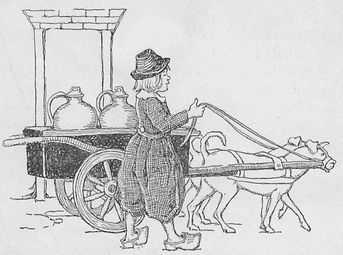
JAN AND HIS DOG CART
One Saturday when Jan was away doing an errand for his mother, Love dug up her precious pink tulip and planted it carefully in a large flower pot. With the pot hugged close to her heart, she went swiftly away from the house, down the long steps, and as far as the road that led along the coast of the sea below the dike. Here, where great merchant ships from all over the world anchored almost every day, Love felt sure that some one would see her tulip and want to buy it.
There was such a crowd,—folk of many nations busy unloading cargoes,—that at first no one saw the little girl with the flower in her arms. Up and down the shore she walked, a little frightened but brave. She held the flower high, and called in her sweet voice, “A rare pink tulip. Who will buy my pink tulip?”
Intent on holding the flower carefully, she came suddenly in front of a man who had been walking in lonely fashion up and down the shore. She heard him call her name eagerly.
“Love! Love! Oh, my little Love!”
Looking up, Love almost dropped the tulip in her joy. Then she set it down and rushed into his arms.
“Father, dear father! Oh, where have you been so long?” she cried.
It was a story told between laughter and tears. Goodman Bradford, only a short time since released from prison, had come straight to Amsterdam, but he had been able to find no trace of Love. Mistress Brewster had gone on with the Pilgrims to America, and there was no one to tell Goodman Bradford where his little daughter was. Now, he could make a home for her and reward Jan’s mother.
“I was patient,” Love said, “as you bade me be, and see,” she cried as, hand in hand, they reached the quaint little cottage where Jan and his mother stood at the door to greet them, “in good time they both came to me—the pink tulip, and my father.”
“See to it, Preserve, that you win a colored ribbon from the schoolmaster to-day,” Mistress Edwards said as she turned from her task of polishing the pewter platter to look at the boy who stood in the doorway of the log cabin.
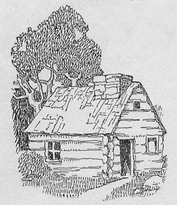
“THE LOG CABIN WAS BUT A ROUGH HOME”
“This is the day, I hear, on which the good-conduct ribbons are given out for the month, brightly dyed ones for the boys and girls whose lessons have been well learned, and black for the dunces. There is no chance of your coming home to me to-night without a ribbon of merit, is there?” The Colonial mother crossed the room and put her hands on her lad’s shoulder, looking anxiously into his honest brown eyes.
“No, mother,” Preserve answered. “At least I have hopes of winning a ribbon. Not once this month have I failed in my sums, and I can read my chapters in the Bible as well as any child in school.”
“That is good!” Mistress Edwards said, pulling the boy’s long, dark cloak more closely about him and smoothing the cloth of his tall hat.
Preserve Edwards was a Puritan lad of many years ago. The log cabin that he was leaving to walk two miles through the clearing and across the woods to school was but a rough home. A few straight chairs and a hard settle, made of logs and standing by the fireplace, a deal table and the few pewter utensils, were almost the only furnishings of the living room. In one corner stood an old musket. Mistress Edwards looked toward it now in fear.
“Do you come home as soon as school is out, Preserve. I pray you do not linger on the way to play hare and hounds with the other boys and girls of the village. Remember, my boy, that your father is away with the horse these two days to fetch back a piece of linsey-woolsey cloth and some flour from Boston for me. He is not likely to come home for some days yet, and I am full of strange dread at what I saw in the cornfield this morning.”
“What did you see, mother?” Preserve’s eyes opened wide with wonder.
“It was not so much what I saw, but what it portended for us,” Mistress Edwards said. “It was only a flash of color, like painted feathers, among the withered stalks of corn. It minded me of Big Hawk’s headdress. If he were to find out that we were alone, one helpless woman and a boy of twelve here, I think it would go badly with us.”
Preserve laughed bravely. Then he reached up to kiss his mother good-bye.
“It was no more than a red-winged blackbird that you saw,” he said, “or perhaps it was a bright tanager. The birds are getting ready to flock, now, for they feel the autumn chill in the air. But I will hurry home—with my ribbon,” Preserve added.
Then he ran down the little path to the gate in the paling that surrounded the cabin, his speller under his arm, and his high-heeled, buckled shoes making the dry leaves scatter as he went.
It was a long road and a lonely one to the log schoolhouse. Preserve took his way through the cornfield where the dried stalks, rattling in the cold wind, made him think of the songs that he had heard Big Hawk and his tribe sing the last time they attacked the little Colonial settlement. That had been some months since, now, and Preserve could find no traces of footprints or any other marks of Indians in the cornfield.
“My mother had a fear for nothing,” Preserve said to himself. He went through a bit of woods, next, and pulled a small square of bark from one of the many birch trees that stood there, so white and still. It was for Preserve to write his sums upon in school, and as he hurried on he repeated his tables over and over to be sure that he knew them well.
There were log cabins scattered here and there, and from these came other boys and girls who followed Preserve on the way to school. Deliverance Baxter joined Preserve. She wore a long, scant, gray frock, and her yellow hair was tucked tightly inside a close, white cap. A white kerchief was folded neatly around her neck, and she, also, wore big buckles on her black slippers. Her eyes twinkled roguishly, though, as she chatted to Preserve.
“There is no doubt at all, Preserve, but that you will wear home the long streamers of red ribbon on your cape this afternoon. I have been quite as perfect as you in my lessons for the month, but, woe is me, I did a great wrong yesterday. You know that Master Biddle, our schoolmaster, has just purchased a new wig from Boston town. The queue in the back is so unusually long and tied with such a large bow that it caught my eye when I was getting the pile of copy books from behind his desk. I know not, Preserve, what witchery was in my fingers, but I tied Master Biddle’s queue to his chair. When he stood up, why, his wig was greatly disarranged; and I must needs stay after school until dusk, sitting on the dunce’s stool. I am most sorry, and will never be so witch-like again. You see I stand small chance of the ribbon, now, Preserve.”
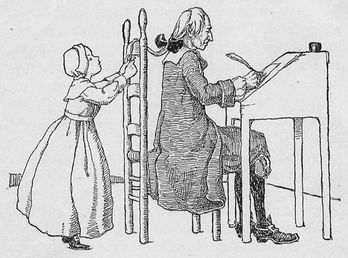
“‘I TIED MASTER BIDDLE’S QUEUE TO HIS CHAIR’”
The boy laughed, but he took the little girl’s hand comfortingly in his. Reaching in his lunch bag, he took out a red apple and slipped it into the big pocket that hung at her side.
“You were always a bit roguish in spite of your Puritan dress and sober living, Deliverance,” he said. “Never mind about the ribbon. If I should win it, why, there is all the more chance of its being yours the next time. Here we are! See to it, Deliverance, that you tie no more queues to-day. Oh, see how finely Master Biddle is dressed for giving out the prizes!” Preserve said as they reached the schoolhouse door and took their places behind the rude desks, built of boards and resting on pegs in the floor.
Other children were quietly taking their places in the little schoolroom, the smaller ones perched on hard benches made of logs. They all looked in awe at the schoolmaster, who stood on a platform, facing them. He wore a smart velvet coat with long tails, and inside it could be seen a waist coat which was very long and a fine white shirt with stiffly-starched ruffles. His knee breeches were of velvet like his coat, and there were silver buckles at the knees as well as on his shoes. A stiffly-ironed stock was wound about his neck, and worn to keep his head stiff and straight as became the dignity of the times. Above all was his white powdered wig, neatly braided in the back.
Looking at Master Biddle alone was enough to make the children of the Colonies sit up very straight and recite their lessons as well as they could. There was a prayer first, and then the boys and girls recited their reading, spelling, and arithmetic. Their pencils were thick plummets of lead and their copy books were made of foolscap paper, sewed in the shape of books and carefully ruled by hand. At eleven o’clock came recess, and at the end of the afternoon the awarding of the good-conduct ribbons.
“For perfect deportment,” Master Biddle announced as he pinned a bow of blue ribbon to one boy’s cape.
“For poor lessons!” he said, sadly, as he fastened a black bow to another. Then he held up a red bow with especially long, streaming ends.
“For perfect deportment, and for perfect lessons,” he said, as he fastened the red ribbon bow to Preserve Edward’s cape.
To-day it would seem but a small prize, but in the eyes of these Puritan boys and girls of so many years ago, the bow of ribbon, its streamers of red gayly flying over the long cape of a boy or the dull linsey-woolsey frock of a little girl, was a mark of great honor indeed. Ribbons were scarce and high in price in those days. Colors for children were almost forbidden, and for their elders as well. So Preserve walked out of the school door at the end of the day with his head very high and started home as proudly as any soldier wearing a decoration for bravery.
He did not notice how the dusk was settling down all about him. The trees on either side, made dark shadows and there was no sound except the whir of a partridge’s wing or the rattle of a falling nut. He did not hear the soft footfall behind him until Deliverance, breathless and her face white with fear, was upon him. She laid a soft hand on his shoulder and whispered in his ear:
“I beg you, Preserve, to let me walk with you. I know that it is not far to my cabin, but all the way through these woods I have heard strange sounds and I fancy, even now, that I see shapes behind the trees and bushes.”
Preserve took the timid little girl’s hand and tried to laugh away her fears.
“So was my mother afraid this morning, at nothing,” he said. “She was of a mind that she saw Indians—Oh!” the boy’s voice was suddenly hushed.
Towering in the path in front of the children, like a great forest tree dressed in its gorgeous cloak of gaudy autumn leaves, stood the Indian chief, Big Hawk. He wore his war paint and his festival headdress of hawk’s feathers. Slung over his blanket were his bow and a quiver full of new arrows. It seemed little more than a second before the edges of the path and the deep places among the trees on either side were alive with the Indians of Big Hawk’s tribe.
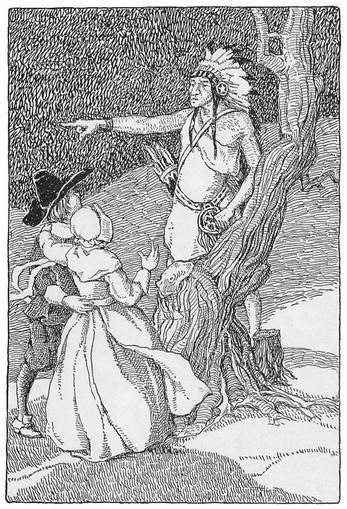
“HE POINTED TOWARD HIS TRIBE’S CAMPING PLACE”
Big Hawk looked at the frightened children, indicating with gestures what was his plan. He pushed back the white cap from Deliverance’s pale forehead and laid his hand on the little girl’s sunny hair. Then he pointed toward his tribe’s camping place in the west. He wanted to take Deliverance there and hold her for a ransom. To Preserve he made gestures showing that he wished him to lead the way to the Edwards’ cabin that they might plunder it before going back that night.
Deliverance clung, crying, to Preserve. He tried to be brave, but it was a test for a man’s courage, and he was only a boy.
It was a second’s thought and a strange whim of a savage that saved the two. The wind of the fall blowing through the trees caught the ends of Preserve’s ribbon of honor and sent them, fluttering like tongues of flame, against the dark of the tree trunks. The color caught Big Hawk’s eye, and he touched the bow on Preserve’s cloak with one hand.
Quick as a flash a thought came to Preserve. He drew back from Big Hawk’s touch and put his own hands over the ribbon as if to guard it.
“Heap big chief!” Preserve’s voice rang out, brave and clear. Then, after waiting a second, he unpinned the red bow and held it, high, before Big Hawk’s face.
“Big Hawk, heap bigger chief!” he said, as he went boldly up to the Indian and fastened the ribbon on his blanket. Then he motioned to Big Hawk to return to his camp and show the rest of the tribe his new decoration. A slow smile overspread Big Hawk’s painted face. Then he turned and, motioning to his braves to follow him, went silently back through the woods, leaving Preserve and Deliverance alone, and safe.
Deliverance was the first to speak.
“My heart does beat so fast I can scarcely breathe, Preserve. Oh, but you are a brave boy! What shall we do now?” the little girl asked.
“Run!” said Preserve, without a moment’s hesitation. “We had best run like rabbits, Deliverance!”
Hand in hand, the two scampered along, Preserve helping the little girl over the rough places, until the light from a candle in Deliverance’s cabin was in sight. Her father had come home early, and when the children told him of their adventure, he set out to warn the rest of the settlers of the danger so bravely averted, and put them on guard against the Indians.
Preserve went on home, alone. His mother stood in the cabin door, anxious because he was so late.
“No ribbon? Oh, my lad, why have you disappointed me!” she said when she saw him.
“Big Hawk wears my decoration,” Preserve said, as he told his story. “But I think that Master Biddle would have rather that little Mistress Deliverance, for all her witching ways, had his red bow,” he finished, laughing.
“It may chance that you will not be able to return by Thanksgiving Day?” Remember Biddle asked with almost a sob in her voice.
A little Puritan girl of long ago was Remember, dressed in a long straight gown of gray stuff, heavy hobnailed shoes and wearing a white kerchief crossed about her neck. She stood in the door of the little log farm-house that looked out upon the dreary stretch of the Atlantic coast with Plymouth Rock raising its gray head not so very far away.
No wonder Remember felt unhappy. Her mother was at the door, mounted upon their horse, and ready to start away for quite a long journey as journeys were counted in those days. She was going with a bundle of herbs to care for a sick neighbor who lived a distance of ten miles away. It had been an urgent summons, brought by the post carrier that morning. The neighbor was ill, indeed, and the fame of Mistress Biddle’s herb brewing was well known through the countryside.
She leaned down from the saddle to touch Remember’s dark braids. The little girl had run out beside the horse and laid her cheek against his soft side. Her father was far away in Boston, attending to some important matters of shipping. Her mother’s going left Remember all alone. She repeated her question, “Shall I be alone for Thanksgiving Day, mother, dear?” she asked.
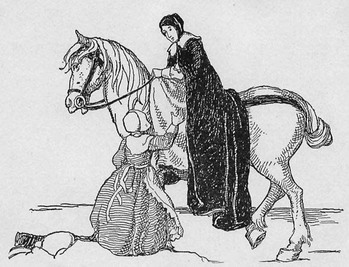
“‘SHALL I BE ALONE FOR THANKSGIVING DAY, MOTHER, DEAR?’”
Her mother turned away that the little daughter might not see that her eyes, as well, were full of sorrow.
“I know not, Remember. I sent a letter this morning by the post carrier to Boston telling your father that I should wait for him at Neighbor Allison’s, and if I could leave the poor woman he could come home with me. I hope that we shall be here in time for Thanksgiving Day, but if it should happen, Remember, that you must be alone; take no thought of your loneliness. Think only of how much cause we have for being thankful in this free, fertile land of New England. And keep busy, dear child. You will find plenty to do in the house until my return.”
Throwing the girl a good-bye kiss, Mistress Biddle gave the horse a light touch with her riding whip and was off down the road, her long, dark cloak blowing like a gray cloud on the horizon in the chill November wind.
For a few moments Remember leaned against the beams of the door listening to the call of a flock of flying crows and the crackling of the dried cornstalks in the field back of the house. Beyond the cornfield lay the brown and green woods, uncut, save by an occasional winding Indian trail. The neighboring cabins were so far away that they looked like toy houses set on the edge of other fields of dried cornstalks. Looking again toward the woods Remember shivered a little. She saw in imagination, a tall, dark figure in gay blanket and trailing feather headdress stalk out from the depths of the thicket of pines and oaks. Then she laughed.
“There hasn’t an Indian passed here since early in the summer,” she said to herself. “Mother would not have left me here alone if she had not known that I should be quite safe. I will go in now and play that I am the mistress of this house, and I am getting it ready for company on Thanksgiving Day. It will be so much fun that I shall forget all about being a lonely little girl.”
It was a happy play. Remember tied one of her mother’s long aprons over her dress to keep it clean, and began her busy work of cleaning the house and making it shine from cellar to ceiling. She sorted the piles of ruddy apples and winter squashes and pumpkins in the cellar, and rehung the slabs of rich bacon and the strings of onions. As she touched the bundles of savory herbs that hung about the cellar walls, Remember gave a little sigh.
“I see no chance of these being used in the stuffing of a fat turkey for Thanksgiving,” she said to herself. “It may be that I shall have to eat nothing but mush and apple sauce for my dinner, and all alone. Ah, well-a-day!” She began to sing in her sweet, child voice one of the hymns that she had learned at the big white meeting-house:
“The Lord is both my health and light;
Shall men make me dismayed?
Since God doth give me strength and might,
Why should I be afraid?”As she sang, Remember lifted a bucket of soft soap that stood on the cellar floor and tugged it up to the kitchen. Then she went to work with a will.
Several days passed before Remember had cleaned the house to her satisfaction. On her hands and knees she scoured the floors, her rosy hands and arms drenched with the foaming soapsuds. Afterward she sprinkled sand upon the spotless boards in pretty patterns as was the fashion in those days. She swept the brick hearth with a broom made of twigs, and she scoured the pewter and copper utensils until they were as bright as so many mirrors. She washed the wooden chairs until the bunch of cherries painted upon the back of each looked bright enough to pick and eat. She dusted the straight rush-bottomed chairs and the settle that stood by the side of the fireplace. Even the tall clock in the corner had its round glass face washed. Then Remember stood in the center of the kitchen looking at the good result of her work.
“My mother, herself, could have done no better!” she thought. Then she looked at the keg that had held their precious store of soft soap. There was no soap to be bought in those long-ago days; the Puritans were obliged to make their own.
“I have used up all the soap. Oh, what will my mother say at such waste? What shall I do?” Remember said, in dismay.
She sat down by the fire and thought. Suddenly she jumped up. A happy plan had come to her.
“I will make a mess of soap,” Remember said to herself. “I have helped mother to make soap many a time and I can do no more than try. It is yet some days until Thanksgiving and I should be sadly idle with nothing more to do, now that the house is put so well in order.”
The soap-making barrel, a hole bored in the bottom, stood in a corner of the cellar; it was light enough so that Remember could easily handle it and she was strong for her twelve summers and winters. In the bottom of the barrel she put a layer of clean, fresh straw from the shed and over this she filled the barrel as far as she could with wood ashes. Then she rolled, and tugged, and lifted the barrel to a high bench that stood by the kitchen door, taking care that the hole was just above a large, empty bucket. Then Remember brought pails of water and, standing on a stool, poured the water into the barrel until it began to drip down through the ashes and the straw into the bucket below. It looked rather dirty as it filtered down into the bucket but Remember took good care not to touch it with her fingers for she knew that it had turned into lye. Late in the afternoon Remember took out a hen’s egg and dropped it into the bucket to see what would happen.
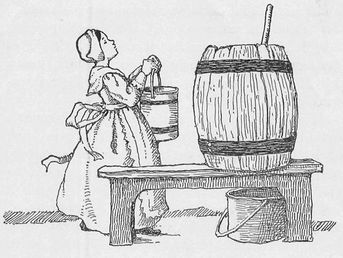
“REMEMBER BROUGHT PAILS OF WATER”
“It floats!” she said. “Now I am sure that I made the lye right and I can attend to the grease to-morrow.”
Remember had to start a huge fire the next day and she got out the great black soap kettle, filled it with the lye and hung it over the fire. Into this she put many scraps of meat fat and waste grease that her mother had been saving for just such a soap-making emergency as this. It bubbled and boiled and Remember carefully skimmed from the top all the bones and skin and pieces of candle wicking that rose, as the lye absorbed the grease, and cooked it into a thick, ropy mixture. It looked very much like molasses candy as it boiled and after a while Remember knew that it was done. She lifted the kettle off the fire and poured the thick, brown jelly, that was now good soft soap, into big earthenware crocks to cool.
“I made the soap quite as well as my mother could,” Remember said to herself with a great deal of satisfaction as she put the crocks, all save one, in the cellar. This one she kept for use in the kitchen.
“There’s not another thing that I can think of to do,” Remember said now. She looked out of the window at the bleak, bare fields behind which the November sun was just preparing to set in a flame-colored ball. “Here it is the afternoon before Thanksgiving Day and mother and father are not home yet, and we haven’t anything in the house for a Thanksgiving dinner!” She looked toward the woods now. What was that?
A speck of color that she could see in the narrow footpath between the trees suddenly came nearer, growing larger and brighter all the time. Remember could distinguish the gaudy blanket, bright moccasins, and feather headdress of an Indian. Stalking across the field, he was fast approaching their little log house which he could easily see from the woods and which seemed to offer him an easy goal. Remember covered her face with her hands, trying in her terror to think what to do.
The bolt on the kitchen door was but a flimsy protection at best. Remember knew that the Indian would be able to wrench it off with one tug of his brawny arm. She knew, too, that it had been the custom of the Indians who were encamped not far off to take the children of the colonists and hold them for a high ransom.
“The white face takes our lands; we take the papoose of the white face,” they had threatened, and they were cruel indeed to the children whom they held, especially if their parents were a long time supplying the necessary ransom. But it had been so long now since an Indian had been seen in their little settlement, that Remember’s mother had felt quite safe in leaving her.
Remember looked now for a place to hide. There was none. The cellar would be the first place, she knew, where the Indian would look for her. The tall clock was too small a space into which to squeeze her fat little body; and there was no use hiding under the bed for she would be dragged out at once. Remember turned, now, hearing a footstep. The Indian, big, brown, and frowning had crossed the threshold and stood in the center of the room. His blanket trailed the floor; over his shoulder was slung a pair of wild turkeys he had killed.
Remember trembled, but she faced him bravely.
“How!” she said, reaching out a kind little hand to him. The Indian shook his head, and did not offer to shake hands with the little girl. Instead, he pointed to the door, motioning to her that she was to follow him.
Remember’s mind worked quickly. She knew that Indians were fond of trinkets and could sometimes be turned away from their cruel designs by means of very small gifts. She ran to her mother’s work basket and offered him in succession a pair of scissors, a case of bright, new needles, a scarlet pincushion, and a silver thimble. Each, in turn, the Indian refused, shaking his head and still indicating by his gestures that Remember was to follow him.
Now he grasped the little girl’s hand and tried to pull her. There was no use resisting. But just as they reached the door the Indian caught sight of the crock of soft soap—dark, sticky, and strangely fascinating to him. He stuck one long brown finger in it and started to put it in his mouth, but Remember reached up and pulled his hand away. She shook her head and made a wry face to show him that it was not good to eat.
“How?” he questioned, pointing to the soap.
Remember pulled from his grasp. Pouring a dipperful of water in a basin, she took a handful of the soap and showed the Indian how she could wash her hands. As he watched a look, first of wonder, and then of pleasure, crept into his face. He smiled and looked at his own hands. They were stained with earth and sadly in need of washing. Remember refilled the basin with water and the Indian, helping himself to a huge handful of the soap, washed his hands solemnly as if it were a kind of ceremony.
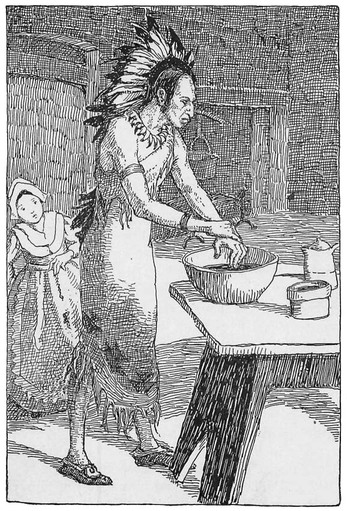
“THE INDIAN, HELPING HIMSELF TO A HUGE HANDFUL OF THE SOAP, WASHED HIS HANDS SOLEMNLY”
As Remember watched him, her heart beat fast indeed. “As soon as he finishes he will take me away,” she thought.
Slowly the Indian dried his hands on the towel she gave him. Then he picked up the crock of soft soap. He set it on his shoulder. Pointing to the pair of turkeys that he had laid on the table to show that he was giving them to Remember in exchange for the soap, he strode out of the door and was soon lost to sight in the wood’s path.
Remember dropped down in a chair and could scarcely believe she was really safe. A quick clatter of hoofs roused her. She darted to the door.
“Father, mother!” she cried.
Yes, it was indeed they; her father riding in front with her mother in the saddle behind.
“Just in time for Thanksgiving!” they cried as they jumped down and embraced Remember.
“And I’m here, too, and we have a pair of turkeys for dinner,” Remember said, half smiles and half tears, as she told them her strange adventure.
“If you will but help me, Hannah, as a little girl of ten should, with the candle dipping you will forget to fret all the day long about the home coming of father and Nathaniel,” Mistress Wadsworth said, laying a kind hand on the bent head of the little daughter.
All through the long, gray afternoon Hannah had looked out of the diamond-shaped panes of the window, past the fields of dried cornstalks that looked as if they were peopled with ghosts in their garments of snow, and toward the forest of pointed, green firs beyond. She turned from the window now, as her mother spoke to her, and looked up bravely, trying to smile.
“You are quite as anxious about dear brother Nathaniel and father as I am,” she said. “It is now two weeks since they started away with the sledge to bring us back the wood for the winter. Father said that it would take him no longer than ten days at the utmost. Brother Nathaniel is only twelve, and young for so hard a journey. There have been storms, and there are Indians—” a sob caught the little girl’s voice.
It was Mistress Wadsworth’s turn to look out now with saddened eyes through the window and into the falling twilight of the New England winter.
“Your father said that he would be home for Christmas Day,” she said, “and he will keep his word unless some ill befalls them. In the meantime, we will make the candles. Then the house will be brighter to welcome them than when we burn only pine knots. To-night, Hannah, we will measure the candle wicking for we shall be busy the greater part of to-morrow with the dipping.”
As the two, both mother and little daughter dressed in the long, straight frocks of dark homespun and the white caps that were worn in those long-ago days, bent over the pine table after supper, they looked very much alike. The fire in the great brick fireplace had a sticky, pitchy lump of fire wood upon the top. It was a pine knot, and the only light in the room. It flickered upon the bright rag rugs of the floor and the painted chairs with their scoured rush seats and on the green settle, making a pleasant, cheerful glow. They tried not to hear the wind that howled down the chimney, or think of the beloved father and little brother who were so far away in a bleak lumber clearing.
Measuring the wicks for the tallow candles was so painstaking a task that Mistress Wadsworth did it herself; Hannah, standing beside her, only watched. She stuck an old iron fork straight up in the soft wood of the table some eight inches from the edge. Around it she threw half a dozen loops of the soft candle wicking. She cut these loops off evenly at the edge of the table. Then she measured and cut more until she had made several dozen, all exactly the same length. As she worked, they talked together of what Hannah most loved to hear about, Christmas in her dear mother’s girlhood home, merry England.
“They had polished brass sconces fastened everywhere to the walls,” Mistress Wadsworth said. She could almost see the bright scene in the dim shadows cast by the pine knots. “In every sconce there would be tall white candles. We burned more candles in a night then than we can afford to burn in a month now,” she sighed.
“And there was a fir tree from the forest brought into the hall for the children,” Hannah continued, for she knew the story well. “There were candles on the tree, lighted and shining. Oh, it must have been a pretty sight to see the children dance about the Christmas tree and sing their carols! We never have Christmas trees with candles in this new land, do we mother? Why?” she asked.
“The Governor decrees that we shall not continue the customs of the land that we have left so far behind,” Mistress Wadsworth replied, but with another sigh. “And now to bed, little daughter, for we shall be busy indeed on the morrow.”
When morning came, Hannah found that her mother had worked after she had gone to bed, twisting and doubling each candle wick and slipping through the loop a candle rod. This rod was a stick like a lead pencil but over three times as long. Six wicks hung from each rod. They looked, Hannah thought, as if they were so many little clothes lines. Then the big iron kettle filled with clean white tallow was swung on a heavy iron hook in the fireplace. As the tallow melted, Mistress Wadsworth directed Hannah as she tipped down two straight backed chairs and placed two long poles across them like the sides of a ladder with no rungs. Across these were laid the candle rods with their hanging wicks. Then the kettle was taken from the fire and set on the wide hearth, and the pleasant task of the candle dipping was begun.
One at a time, Hannah took the candle rods carefully by their ends and dipped the wicks for a second in the melted tallow. Then she put it back between the chairs to dry and took up another rod, dipping the wicks in the same way. When the last wicks had been dipped, the first ones were dry enough to dip again. With each dipping, the candles grew plump and straight and white. One candle rod, though, Hannah dipped only once in every three times. When her mother noticed this she said, “Little daughter, you are neglecting six of the candles. See how small they are!”
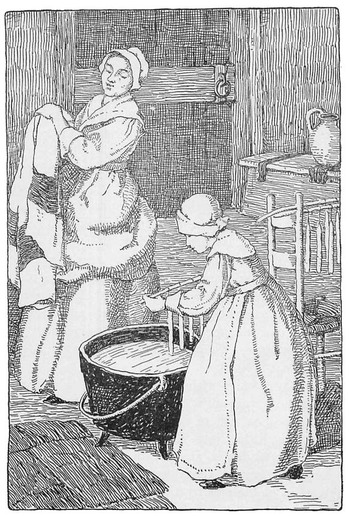
“HANNAH DIPPED THE WICKS FOR A SECOND IN THE MELTED TALLOW”
Hannah ran over, threw her arms about her mother’s neck and whispered something in her ear. Mistress Wadsworth shook her head at first; then she smiled.
“It can do no harm that I see,” she said. “It will be only a child’s play before Christmas and no cause for the Governor’s displeasure. Yes, little daughter, if you wish. If it brings joy to your sorrowful heart, I shall be glad.”
When the candle dipping was over and the precious candles were laid away to be burned only if the father and little Nathaniel came home, Hannah slipped six, as small as Christmas tree candles, from one rod and wrapped them carefully in a bit of fair white linen. They were her little candles, to be used as she wished.
The days, white with snow and very cold, wore on until it was only a week before the blessed Christmas day. There were slight preparations for it in the little New England settlement where Hannah lived for it was not thought fitting to be merry and gay at Christmas time these centuries ago. But at the small white meeting-house Hannah and the other little colonist children practised a carol to be sung on Christmas Day.
“Shout to Jehovah, all the earth,
Serve ye Jehovah, with gladness;
Before him bow, singing with mirth.”The children sang it as it was pitched by the elder’s tuning fork, and the tune was slow and dirge like. The tears came again to Hannah’s eyes as she tried to sing, for no word had come as yet of father and Nathaniel. A runner to the village brought word a few days before of attacks by the Indians on near-by parties of wood cutters. Could they have encountered the party with whom were father and Nathaniel, she thought?
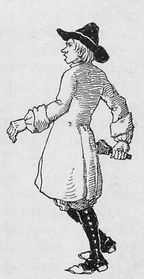
THE TOWN CRIER
But Hannah’s secret kept her happy! A few days before Christmas she went to a near-by bit of woodland. She carried the old hatchet that Nathaniel had left at home, and she looked over the young fir trees until she found one that was well shaped, tiny, and as green as green could be. She chopped and hacked at the roots until she cut down the little tree. Then she tugged it home. As she held its prickly needles close to her warm cloak she whispered, “You are not to bear gifts, little Christmas tree, because that would not be right; only candles to light the way home for dear father and brother Nathaniel.”
At last it was three days before Christmas and evening in the little New England village. The town crier had taken his way through the narrow main street early in the afternoon,—a dismal enough looking figure in his long, black cloak and tall, black hat, and ringing his bell.
“Lost, in all probability, lost,” he called. “This Christmas time,” and then he gave the toll of names of the men and boys who had started out so many weeks before on the ill-fated lumber trip and from whom no word had come. As he reached the names, “Goodman Wadsworth, little Nathaniel Wadsworth,” Mistress Wadsworth cowered in front of the fire, her bowed head in her hands. But Hannah kissed her gently for comfort, and took out the little tallow candles that she had dipped. Then she set up the tiny fir tree, with the lighted Christmas candles, in front of the window that looked out upon the main street.
Now the village was black with the night. The fires were low, and the barred doors and windows shut in Hannah’s and her mother’s sadness. The long street was white with snow. A few glimmering stars shed a fitful path of light down it, but the houses were like so many tightly-closed eyes. They could hardly be seen at all.
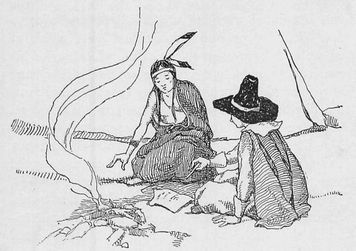
“THE LITTLE WHITE BOY ... HAD PRINTED STRANGE CHARACTERS”
It was almost ten o’clock when an Indian boy, little Fleet-as-an-Arrow, like a flash of color in the dark of the night, darted down the street. He was wrapped from head to foot in his scarlet blanket. He was panting. His bare limbs were cold. He had come a long, long way without food since morning, but he did not stop running now that he was nearing his goal. The dim little town frightened him, though. He had never been in so strange a place before. The home that little Fleet-as-an-Arrow knew was a wide plain with a background of forests; his house was a painted wigwam; and his light was a camp fire. But he pressed against his heart a bit of white birch bark upon which a little white boy of his own age, brought to the camp a captive with a band of prisoners, had printed strange characters. It was not like the picture writing of the tribe, but it must be important for all that, Fleet-as-an-Arrow knew. The little white boy, whom this little Indian boy had grown to love like his own brother, had begged him to carry the writing to his mother.
“Go to the North,” he had said. So Fleet-as-an-Arrow had watched the moss on the trees and followed the north star. Here he was, but how could he tell in which of all these strange wigwams the mother of his little white friend lived?
Suddenly Fleet-as-an-Arrow’s dark eyes flashed into a smile. At the end of the street a bright light attracted him. He ran on, bravely following it. Of all the windows in the whole village this was the only one that was unbarred, and where the curtains were parted. As he came nearer the light, Fleet-as-an-Arrow’s heart almost stopped beating for admiration and wonder. Never in all his twelve years had the little Indian boy seen a sight like this. It was an evergreen tree such as he knew and loved in his own home forest, but it was covered with glimmering, sparkling, starry lights. There it stood, Hannah’s Christmas tree, the little tallow candles drawing Fleet-as-an-Arrow with Nathaniel’s message like a magnet.
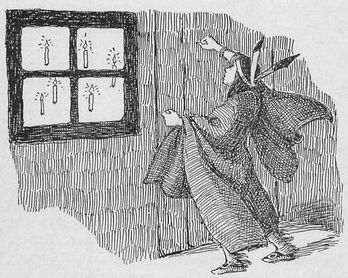
“HE BEAT THE HEAVY OAK PANELS WITH HIS HALF-FROZEN, BROWN LITTLE HANDS”
He stopped at the door and beat the heavy oak panels with his half-frozen, brown little hands. When Mistress Wadsworth, followed closely by Hannah, opened it, frightened and dazed at the strange visit in the night, Fleet-as-an-Arrow looked at them a minute on the threshold. In the light of the little Christmas tree he could see Hannah’s pink cheeks and wide-open, blue eyes and the pale gold braids of her hair. Why, she looked like the boy that he had left in the Indian’s camp, Fleet-as-an-Arrow saw. He knew now that he had found the right place. He went inside and pulled the message, written with a bit of charcoal in scrawling letters on the square of birch bark, from beneath his blanket. Then he thrust it into Mistress Wadsworth’s hands. She read it in the glow of the fire.
“We are safe, but the Indians will not let us go without gifts of beads and corn. Send some men to fetch us.
Your son,
Nathaniel.”
With a glad cry, Mistress Wadsworth put her arms about the little Indian boy. Then, while she put on her bonnet and cloak and lighted the big, brass lantern, Hannah drew Fleet-as-an-Arrow up to the fire and brought him food. Running with her lantern from one sleeping house to another, Mistress Wadsworth soon roused the men of the village who organized themselves into a rescuing party.
When the first pale pink of the morning sun tinged the sky, the party, with the gifts which the Indians demanded as a ransom for their captives, was on its way. They carried Little Fleet-as-an-Arrow in front as their guide.
Such a Christmas Eve as it was. Father and Nathaniel, ragged and hungry, but safe, were home in time! Two of the large tallow candles in the polished brass candlesticks shone on the mantelpiece over the fireplace, and Hannah lighted the little Christmas tree again. She and brother Nathaniel, hands clasped happily together, sat in its light, so glad to be together again that they needed neither gifts nor sweets to make their Christmas joy.
The grim iron doors of the prison clanged shut and the turnkey fastened them. Hearing the sound, Desire touched the homespun sleeve of the little boy with whom she was walking home from market down the narrow street of the musty old town of Salem.
“Did you hear that sound of the locking of the doors, Jonathan? It means that they’ve caught and imprisoned another witch.”
The boy, a quaint little figure in his long trousers, short jacket, and ruffled shirt looked, wide-eyed, at the little girl. Quite as strangely dressed a child as Jonathan was small Desire, the only daughter of Elder Baxter who was high in authority in old Salem in those far-away days. Although not quite twelve summers and winters of the New England of a stern long-ago had painted Desire’s plump cheeks the pink of a rose and burned the shining gold of her hair, her gray frock with its short waist and long skirt nearly trailed the gray cobble stones of the street. Her soft brown hair was braided close to her head and pulled back tightly in front from her white brow and tucked out of sight beneath her stiff cap. A white kerchief was folded closely about her primly held shoulders and over her frock she wore a long, dark cape for the fall day was chill.
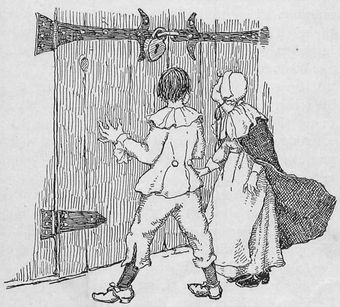
“‘DO YOU KNOW WHO THE WITCH IS, DESIRE?’ HE ASKED”
Jonathan set down the rush basket of food supplies that he was carrying for Desire, and he touched the iron paling that shut in the prison.
“Do you know who the witch is, Desire?” he asked, his voice low with awe.
“Not I,” the little maid answered, “but they do say that she has been brewing her spells for six months’ time before the elders caught her. I heard my father and mother talking about it only this morning. They said that before the day was over the witch that was the cause of all our recent troubles in Salem would be caught and safely imprisoned.”
“What troubles?” Jonathan asked.
“Have you not heard, Jonathan?” Desire lowered her voice and looked up and down the street to see that no one was listening to her.
“Abigail Williams was ill of the whooping cough and she had three fits which, as every one knows, is a sign that a witch had cast a spell over her. And Mercy Talcott’s teakettle boiled over and nearly scalded Mercy’s mother. On the way for some ointment at the doctor’s to put on her mother’s hand, Mercy saw the witch herself flying over the tops of the trees on Gallows Hill and,” Desire’s voice was a whisper now, “she was riding on a broomstick.”
“How did Mercy know that it was a witch, and how could she be riding on a broomstick?” asked the practical Jonathan.
Desire tossed her head. “I can’t explain that to you, Jonathan. It was toward evening and Mercy says that she saw a long, dark form in the trees and she heard the dry leaves rustle.”
“Crows!” said Jonathan.
“For shame, Jonathan,” said Desire. “Do you not know that the eyes of Mercy Talcott are keen for seeing witches. She is to be at the trial to-morrow, and identify the evil creature.” Desire repeated the words of her elders in those far-away Colonial days of ignorance and superstition. “When shall we rid ourselves of this pest of witchcraft in Salem?” she said.
“Well,” Jonathan said, swinging the basket upon his shoulder and leading the way along the street again, “There’ll probably be one less witch to-morrow for she won’t have a chance to escape if that tale-bearing Mercy Talcott is at the trial. Let us go on by the side street and see if Jack is safe at Granny Hewitt’s, Desire.”
The two children hastened their steps and passed the scattering little brown houses of old Salem. Their quaintly gabled roofs made them look like dolls’ cottages. The windows with their tiny diamond-shaped panes were neatly curtained with white. At one house, a little larger than the others and having no garden, they drew their breath.
“The Witches’ House,” said Desire.
It was here that so many of these unfortunate creatures of the dark days of Salem had been kept in confinement before they met their punishment in prison, on the ducking stool, or on Gallows Hill. A little farther along they passed a great white meetinghouse where a gilded weathercock pointed bravely to the sky and high, white pillars stood at either side of the doorway.
“The witch will be tried here in the morning,” Jonathan said, and the two children walked a little faster toward a pleasanter stopping place, Governor Endicott’s big white house, set in the midst of his fair English garden.
Even now, when the wind blew cold from the water front and rustled the cornstalks and rattled the red pods of the rose hips, the Governor’s garden was a pleasant place for a child to see. Bright little marigolds, defying the frost, lifted their orange blossoms along the path. Great beds of scarlet dahlias and purple asters made a mass of color. The late sun marked for itself a long, golden shaft across the sundial, and at the back of the house could be seen a patch of winter squashes and pumpkins mellowing in a sunny spot.
“Was not the Governor kind to give us the pumpkin?” said Jonathan.
“And wasn’t Granny kind to show us how to make it into so strange a hobgoblin of a creature as is our Jack?” added Desire. “She said that almost no other granny in old Salem was old enough to remember about carving a pumpkin into a face as they did long ago in England. She told me that we must keep it a secret until All Hallow E’en, and then take the pumpkin with a tallow drip shining inside him, lighting his funny face, down through the street to show the other children.”
“I lighted it last night,” Jonathan confessed. “I went to Granny’s house with a cheese ball that was a gift from my mother to Granny.”
“How did the pumpkin look?” asked Desire eagerly.
“Fearsome!” said Jonathan. “We put it in the window and I went outside in the dark to look at it. It had the appearance of a grinning monster,” the boy laughed at his memory of the Jack-o’-Lantern.
“Here we are at Granny’s. Let us go in a moment,” Desire said as the two stopped before a tumble-down cottage at the end of a tiny lane. Granny Hewitt lived alone there, a little wrinkled crone with a face like a brown walnut and eyes that shone like two stars. But her mouth, oh, that was the best part of Granny; all the children said that it made them think of their own dear mother’s when she smiled. How could a smile be lovelier than that?
Having no kin of her own, Granny Hewitt loved the boys and girls who passed her cottage every day on their way to and from school. She made molasses cookies and vinegar taffy for them. She put balm on their scratches, and covered their primers and spellers with pieces of bright calico. No wonder Desire and Jonathan wanted to stop a moment at Granny Hewitt’s house. They went up the white gravel path with its neat border of clam shells. Desire lifted the big brass knocker on the door, letting it drop with a clang.
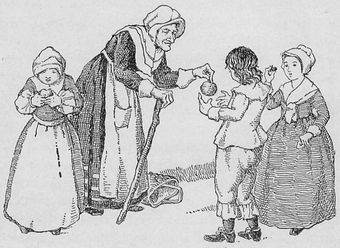
“GRANNY HEWITT LOVED THE BOYS AND GIRLS”
There was no sound inside.
“She has gone to market,” Jonathan said.
“Well, good-bye, Jonathan,” Desire said, taking her basket from the boy’s hands. “I probably shall not see you to-morrow. It may be that my father will let me sit in our pew in the meeting-house during the witch’s trial.”
Jonathan’s eyes almost popped out of his head in surprise. “Could I go, too?” he asked.
“I’ll see if I can get you in,” Desire promised as the two friends parted.
The morning of the witch’s trial was as bright and peaceful as the fall sun lighting field and dingy streets and roofs could make it. By half-after seven, although the trial was not to begin until ten, the green common that surrounded the Second Meeting-house was a moving black and gray mass of stern men in their dark capes, buckled shoes, and tall hats, and gray-gowned women.
Inside the meeting-house every pew was filled. The platform was lined with the black-gowned elders, and the Governor himself, a dignified figure in his flowing cloak and powdered wig, occupied the pulpit. Desire sat, prim and quiet beside her mother, her little round head not much above the high back of the pew. On the other side sat Jonathan whose urgent request to come had been granted.
It was rumored that the witch who was about to be tried was of some repute in the practice of magic, and that she was to be made an example for any followers whom she might have.
Jonathan nudged Desire’s elbow. “Where is she?” he asked.
“Ssh,” the little girl put a warning finger to her lips. “They’ll bring her out in a minute.” As she finished her whispered warning, her father, Elder Baxter, rose and began to speak.
“We are met together to pass judgment upon a woman of Salem town who has wrought her magic arts to the undoing of its citizens. She has cast her spell over a child and thrown it into dire sickness. She has bewitched the kitchen of our neighbor, Elder Talcott. A child of twelve years and well versed in the art of discovering witchcraft saw this same witch after she had practised her arts. Mercy Talcott will please come to the platform. Bring in the witch.”
Desire and Jonathan craned their necks to see better as the black row of the elders parted to let in a bent, trembling little old lady. Two jailers guarded her, one on each side. She still wore her tidy white apron with its knitting pocket, and her white cap was tied neatly under her chin. She was shaking from head to foot with her fright. Her head was bent low so that no one could see her face. She held her Bible clasped closely to her heart.
At the same time Mercy Talcott, a little girl dressed like Desire but with a less winning face, stepped up, also, to the platform. It was the custom of those strange days to believe that certain children could identify witches, and Mercy was one of these children.
The elder spoke again, “I have not made one most important charge of all as I wish to make it in the presence of the prisoner, herself. She has a creature of some other kind than human with whom she consults on matters of witchery. It has been seen at night looking out of her window with glaring eyes and wide-open mouth set in its huge head.
“Look up, witch. Mercy Talcott, is this the witch that you saw leaving your house the day that your mother was burned?”
Slowly, and in terror the little old lady lifted her head. At the same time and in the same sobbing breaths Jonathan and Desire said, “It is Granny Hewitt!”
Mercy saw, too, who it was. She remembered the little rag doll that Granny had made her when she was a very little girl. It wore a gay pink calico dress, and its cheeks were stained red with pokeberry juice. Mercy caught her breath and hesitated. She knew that it was only in fancy that she had seen the broomstick and its wild rider. As she waited, Desire pulled Jonathan from his seat. Before her mother could question or stop them, the two children were at the front of the pulpit, facing the Governor.
Desire clasped her hands and raised them in pleading toward the great man who bent down toward her in surprise. The whole meeting-house was still as Desire spoke in her sweet, high voice.
“Your Excellency, I beg your mercy for our dear Granny. She is not a witch but a kind friend to all the children of Salem. It is I who should be punished in her place. If your Excellency will but think back to the last tithing day, you will remember that you gave two children, Jonathan and me, a pumpkin for our play. We took it to Granny Hewitt’s house and she helped us to make it into a Jack whose tallow drip, lighted, in Granny’s window some one saw and spoke of to you. My father did not know that it was my fault, else he would not have accused Granny. Oh, speak, Jonathan, and attest to the truth of what I am saying!”
She turned to the little boy but Jonathan, made courageous by Desire’s bravery, had gone to Mercy’s side.
“It was crows you saw on Gallows Hill,” he said in her ear. “You never, never saw Granny Hewitt riding on a broomstick. Say so.”
Mercy looked into Granny’s tear-stained face. Then, with a rush of love she threw herself into her arms. “I never saw Granny riding on a broomstick. She isn’t a witch,” Mercy declared.
The white doors of the meeting-house opened wide and the people waited with heads bowed, half in shame and half in joy, as Granny, surrounded by the children, passed into the sunshine and the freedom outside. Then they followed, making a kind of triumphal procession to the cottage at the end of the street. Kind hands led Granny all the way and kind hearts made her forget all about her experiences. In her window there still stood the grinning Jack-o’-lantern, and at sight of it bursts of laughter took away all thought of tears. One of the elders set it upon one of Granny’s fence posts and then held Desire up beside it.
“Hurrah for the Jack-o’-lantern witch,” some one said, and the crowd shouted their happiness and relief.
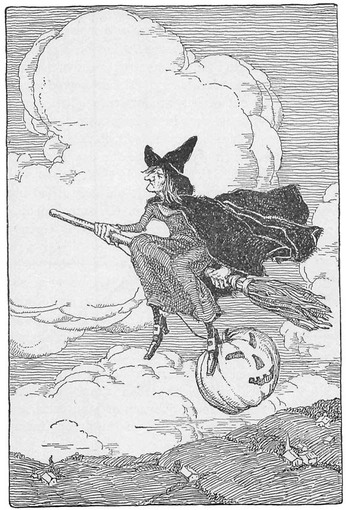
“THE JACK-O’-LANTERN WITCH”
“Did you see him to-day?” asked a little girl in gray, all excitement, as she opened the door to admit her brother.
The boy, shaking with the cold—for it was winter and his jacket was none too thick—set down his basket on the rough deal table, and leaned over the tiny fire that burned on the hearth. His eyes shone, though, as he turned to answer his sister.
“Yes, Beth, I saw him down at the wharf and he gave me this.” As he spoke, William drew from underneath his coat, where he had tucked it to surprise Beth, a crude little brush made of rushes bound together with narrow strips of willow.
“What is it?” Beth took the brush in her hands and held it up to the light, looking at it curiously. She made a quaint picture in the shifting light of the fire, a little Quaker girl of old Philadelphia, her yellow curls tucked inside a close-fitting gray cap, and her straight gray frock reaching almost to the heels of her heavy shoes.
“It is something new for cleaning,” William explained. He took the brush and began sweeping up the ashes on the hearth, as Beth watched him curiously. “Mr. Franklin brought a whole bunch of them down to the wharf to show to people, and he gave me one.”
“How did he make it?” Beth asked curiously.
“It took him a whole year, for it had to grow first,” William explained. “He saw some brush baskets last year that the sea captains had brought fruit in, lying in the wet on the wharf. They had sprouted and sent out shoots, so what did Mr. Franklin do but plant the shoots in his garden. They grew and this year he had a fine crop of broom corn, as he called it. He dried it, and bound it into these brushes. He has some with long handles, and he calls them brooms.”
The children’s mother had come in now from the next room and she grasped the hearth brush with eagerness.
“It is just what Philadelphia, the city of cleanliness, needs,” she said, as she went to work brushing the corners of the window sills and the mantle piece. “If we were to take more thought of our houses and less of these street brawls as to who is for, and who is against the king, it would be better.”
“That is what Mr. Franklin does,” William said. “Do you remember how the streets were full of quarreling folk last summer, and a hard thunder storm came up that every one thought was sent directly from the skies as a punishment for our wickedness? The women and children were crying, and the men praying when Mr. Franklin came in their midst. I can see him now, looking like a prophet with his long hair flowing over his shoulders and his long cloak streaming out behind him. As the skies flashed with lightning and the thunder crashed he told them not to be afraid. He said that he would give them lightning rods to put on their houses that would keep them from burning down.”
“Yes,” their mother said. “He helps us all very much. Mr. Franklin is truly our good neighbor in Philadelphia.”
As her mother finished speaking, Beth emptied the basket that William had brought in. There was not a great deal in it—a little flour, some tea, a very tiny package of sugar, and some potatoes. She arranged them on the shelves in the kitchen, shivering a little as she moved about the cold room.
Chill comfort it would seem to a child to-day. Philadelphia was a new city, and these settlers from across the sea had brought little with them to make their lives cheerful. Outside, huge piles of snow drifted the narrow streets and were banked on the low stone doorsteps of the small red brick houses. A chill wind blew up from the wharves and such of the Friends as were out hurried along with bent heads, against which the cold beat, and they wrapped their long cloaks closely around them.
It was almost as cold in the Arnold’s house as it was outside. The children’s father had not been able to stand the hardships of the new country, and there were only Beth, and William, and their mother left to face this winter. Mrs. Arnold did fine sewing, and William ran errands for the sailors and merchantmen down at the wharves, having his basket filled with provisions in return for his work. It was a hard winter for them, though; no one could deny that.
Mrs. Arnold drew her chair up to the fireplace now and opened her bag of sewing. Beth leaned over her shoulder as she watched the thin, white fingers trying to fly in and out of white cloth.
“Your fingers are stiff with the cold,” Beth exclaimed as she blew the coals with the bellows and then rubbed her mother’s hands.
“Not very,” she tried to smile.
“Yes, very,” William said as he swung his arms and blew on his finger tips. “We’re all of us cold. It would be easier to work if we could only keep warm.”
Just then they heard a rap at the brass knocker of their door. Beth ran to open it, and both children shouted with delight as a strange, slightly stooping figure entered. His long white hair made him look like some old patriarch. His forehead was high, and his eyes deep set in his long, thin face. His long cloak folded him like a mantle. He reached out two toil-hardened hands to greet the family.
“Mr. Franklin!” their mother exclaimed. “We are most glad to see you. You are our very welcome guest always, but it is poor hospitality we are able to offer you. Our fire is very small and the house cold.”
“A small fire is better than none,” their guest said, “and the welcome in Friend Arnold’s house is always so warm that it makes a fire unnecessary. Still,” he looked at the children’s blue lips and pinched cheeks, “I wish that your hearth were wider.”
He crossed to the fireplace, feeling of the bricks and measuring with his eye the breadth and depth of the opening in the chimney. He seemed lost in thought for a moment, and then his face suddenly shone with a smile like the one it had worn when he had seen the first green shoots of the broom corn pushing their way up through the ground of his garden.
“What is it, Mr. Franklin?” Beth asked. “What do you see up in our chimney?”
“A surprise,” the good neighbor of Philadelphia replied. “If I make no mistake in my plans, you will see that surprise before long. In the meantime, be of good cheer.”
He was gone as quickly as he had come, but he had left a glow of cheer and neighborliness behind him. All Philadelphia was warmed in this way by Benjamin Franklin. Whenever he crossed a threshold, he brought the spirit of comfort and helpfulness to the house.
“What do you suppose he meant?” Beth asked as the door closed behind the quaint figure of the man.
“I wonder,” William said. Then he took out his speller and copy book and the words of their visitor were soon forgotten.
But all Philadelphia began to wonder soon at the doings at the big white house where Benjamin Franklin lived. The neighbors were used to hearing busy sounds of hammering and tinkering coming from the back where Mr. Franklin had built himself a workshop. Now, however, he sent away for a small forge and its flying sparks could be seen and the sound of its bellows heard in the stillness of the long, cold winter nights. Great slabs of iron were unloaded for him at the wharf, and for days no one saw him. He was shut up in his workshop and from morning until night passers-by heard ringing blows on iron coming from it as if it were the shop of some country blacksmith.
“Benjamin Franklin wastes his time,” said some of the Philadelphians. “He should be in the town hall, helping us to settle some of our land disputes.”
But others spoke more kindly of the man of helpful hands.
“Mr. Franklin is making Philadelphia truly a City of Friends by being the best Friend of us all,” they said.
None could explain Benjamin Franklin’s present occupation, though.
In the middle of the winter Beth and William and their mother went to a friend’s house to stay for a week. Mrs. Arnold was not well, and the house was very cold. The week for which they were invited lengthened into two, then three.
“We must go home,” Mrs. Arnold said at last. “Mr. Franklin said that he would stop this afternoon and help William carry the carpet bag. It is time that we began our work again.”
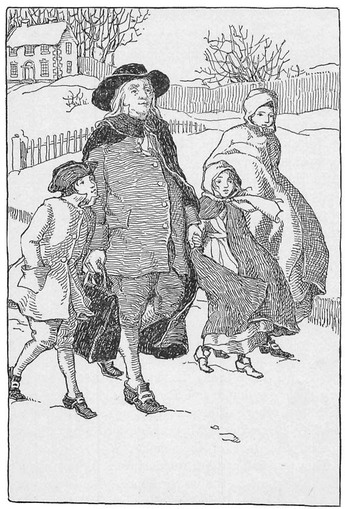
“THEY TOOK THEIR HOMEWARD WAY THROUGH THE SNOW”
As they took their homeward way through the snow, they noticed, again, the happy smile on Mr. Franklin’s kind face. He held the handle of the bag with one hand and Beth’s chilly little fingers with the other. He was the spryest of them all as they hurried on. They understood why, as they opened the door of their home.
They started, at first, wondering if, by any chance they had come to the wrong house. No, there were the familiar things just as they had left them; the row of shining copper pans on the wall, the polished candlesticks on the mantel piece, the warming pan in the corner and the braided rag rugs on the floor. But the house was as warm as summer. They had never felt such comforting heat in the winter time before. The fireplace, that had been all too tiny, was gone. In its place, against the chimney, was a crude iron stove, partly like a fireplace in shape, but with a top and sides that held and spread the heat of the glowing fire inside until the whole room glowed with it.
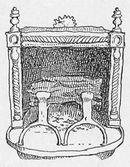
THE FIRST STOVE
“That is my surprise,” Mr. Franklin explained, rubbing his hands with pleasure as he saw the wonder and delight in the faces of the others, “an iron genie to drive out the cold and frighten away the frosts. You can cook on it, or hang the kettle over the coals. It will keep the coals alive all night and not eat up as much fuel as your draughty fireplace did. This is my winter gift to my dear Friend Arnolds.”
“Oh, how wonderful! How can we thank you for it? We, who were so poor, are the richest family in all Philadelphia now. Now I shall be able to work!” the children’s mother said.
Beth and William put out their hands to catch the friendly warmth of the fire in this, the first stove, in the City of Friends. It warmed them through and through. Then William examined its rough mechanism so that he would be able to tend it, and Beth bustled about the room, filling the shining brass teakettle and putting a spoonful of tea in the pot to draw a cup for their mother and Mr. Franklin. At last she turned to him, her blue eyes looking deep in his.
“You are so good to us,” Beth said. “Why did you work so hard to invent and make this iron stove for us?”
The kindest Friend that old Philadelphia ever had stopped a second to think. He never knew the reason for his good deeds. They were as natural as the flowering of the broom corn in his garden. At last he spoke:
“Because of your warm hearts, little Friend,” he said. “Not that they needed any more heat, but that you may see their glow reflected in the fires you kindle in my stove.”
And so may we feel the kindly warmth of Benjamin Franklin’s heart in our stoves, which are so much better, but all modelled after the one he made for his neighbors in the Quaker City of long ago.
“Is it, think you, because her father is the President of the Continental Congress that Susan Boudinot behaves so?” Abigail whispered the question across the aisle of the Dame’s school in old Boston to one of the other little old-time lassies.
“Perhaps that is it. Look at her now. She minds it not in the least that she must sit in the dunce’s corner. She is smiling with those red lips and big blue eyes of hers as though she were not in disgrace,” the other little girl whispered back.
From other corners of the schoolroom came whispered comments about the wilful little Susan.
“What did Susan do that she was put in the dunce’s corner?”
“Indeed she did a great deal to try the good Dame’s patience. She tied the braids of Mercy Wentworth and Prudence Talbot together so tightly that when the Dame called upon Mercy to bring her copy book to her to show its pothooks, Prudence was well nigh dragged too. As if this were not enough, Susan put sand in the ink and made it so thick as to spoil the good Dame’s copperplate writing.”
The school was hushed, though, as the Dame who taught it entered and took her seat behind the desk, a quaint figure in her black gown, white apron, great spectacles and smoothly-parted back hair. All the children of these old Colony days, seated in front of her on the hard benches, bent their heads low again over their spellers or slates. Their hair was smoothly cropped or tightly braided. Only the wayward little girl, perched high upon the dunce’s stool, wore her hair in a mass of tangled curls. They gleamed like gold in the sunshine that filtered in through the window. Susan’s hair was like her own wilful little self, impatient of bounds and training.
As the Dame had returned to the room Susan’s lips had drooped a little and lost their smile. She cast her eyes toward the toes of her buckled shoes just above which ruffled the dainty white frills of her pantalettes. She crossed her hands demurely in the lap of her short-waisted, rose-sprigged gown. Presently, though, Susan looked up and glanced out of the school window. There was the green Boston Common, and the white meeting-house, and the brick mansions with their wide white doorways and brass knockers. Susan could see in fancy as far as the sea front, where she knew there were British ships at anchor with the fishing smacks and the merchant vessels of the Colonies.
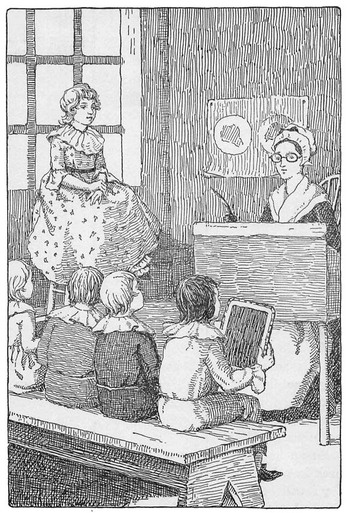
“THE WAYWARD LITTLE GIRL, PERCHED HIGH UPON THE DUNCE’S STOOL”
These were troubled times, as Susan well knew, for the settlers in the new land. She heard her father speak of the growing discontent of the Colonies against the stern rule of the English King, and their disinclination to pay taxes on goods when they were allowed no representation in Parliament.
Only that morning, as Susan had pouted and frowned when her mother tried to comb out her twisting, tangling curls, there had been the sound of loud voices in the next room where her father received his business callers. Susan’s sweet-faced mother had sighed.
“Ah, Susan dear, why do you add to our troubles by being such a wilful little lass. Hear you not the voices in the other room? It is the King’s collector, and your father is trying to explain to him that the Congress feels it especially unjust to be obliged to pay a tax on tea—that pleasant beverage that is so much drunk at the Boston parties. I know not how it will all come out, and my heart is aching for the trouble that I feel will come. Be good, dear child. This will help us as you can in no other way.”
Susan had thrown her arms about her mother’s neck in a burst of love.
“I will be good, dear mother. I will be good,” she had exclaimed, for at heart there was no kinder child in all Boston than little Mistress Susan Boudinot. The scene came back to her now and she turned toward her teacher, the Dame, reaching out her slim little arms imploringly. What right had she, a little girl, to be naughty when her country was in such dire peril, she thought?
“I will be good,” she said in a burst of penitent tears as the Dame motioned kindly to her to leave the dunce’s corner. “I do not know why I was moved to tie Mercy and Prudence together by their hair except it was what the elder speaks of in meeting as the old Adam coming out of one. And I am sorry indeed about the ink.”
“That will do,” the Dame said, trying not to smile. “Take your seat, Susan, and write at least ten times, ‘Be ye kind to one another,’ in your copy book, and remember to keep it treasured in your mind as well as on the white pages.”
Susan slipped gladly into her place beside Abigail and was soon scratching away with her quill pen as industriously as any of the others.
School was not out until late in the afternoon, and Susan, surrounded by Abigail and Mercy and Prudence and many of the other little Colonial maidens, took their merry way through the narrow, brick-paved streets of old Boston. In their flowered poke bonnets, round silk capes, and full skirts they looked like a host of blossoms of as many different colors—lavender, green, pink, and blue. At the gate of one of the old mansions not far from the Common, Susan, her curls flying and her cheeks rosy from the warm sea air, waved her hand in good-bye.
“I would invite you all to come in for a game of battledore and shuttlecock in the garden, but my mother was not feeling well when I left her this morning and I see her beckoning to me from her window.” She darted through the door and up the wide staircase. She found her mother almost in tears.
“There is to be a party at the Royal Governor’s house,” Madam Boudinot exclaimed, “this very afternoon, and there will be no one to represent your father’s family, for I feel far too ill to put on my best dress and go. Many prominent people will be there representing the Colonists and the King. Oh, what shall I do!”
Susan considered a moment, at the same time capably fetching the lavender salts for her mother, and putting cloths wet with toilet water on her aching head. Then she had an idea, for there was much wisdom packed away in the curl-crowned head of nine-year-old Mistress Susan.
“Do you set your mind and heart at rest, dearest mother,” she said. “I will do my hair up so.” Standing in front of an oval, gilt-framed mirror, Susan caught a few of her curls at the back. She pulled them up to the top of her head, and fastened them there with a band of velvet, while the rest hung in a golden shower over her shell pink ears.
“There,” Susan exclaimed. “I look as old as a miss of fourteen and I can be quite as dignified. I will put on my best silk dress, and my silk hose, and my Sunday shoes with the silver buckles.” As she spoke, Susan pulled out boxes and opened a chest and drawers. Then she stood in front of her mother, her arms loaded with finery. She made a quaint little curtsey.
“The family of the President of the Continental Congress will be represented at the Royal Governor’s party,” she said. “Mistress Susan Boudinot will take the place of Madam Boudinot.”
A space of a half-hour later a dignified little lady stepped out of the door of the Boudinot mansion and into a waiting chaise. Susan held her head very high. Was not her hair done up for the first time, and its mass of ringlets pinned with one of her mother’s tortoise-shell combs? Her buff brocade dress was made with a lace underbody. A polonaise and deep frills of lace edged the elbow-length, close-fitting sleeves and fell as far as the small white hands. A blue locket on a strip of narrow black velvet ribbon was hung about the little girl’s throat, and over it all was thrown a ruffled cape of her mother’s lined with fur. As the chaise rattled away toward the Governor’s mansion her mother’s parting words to her repeated themselves over and over again in Susan’s mind.
“Be a good child, Susan, and do not forget for a moment that you are representing your father and, through him, the Congress.”
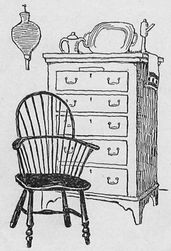
COLONIAL FURNITURE
It was a gay scene in which little Mistress Susan soon found herself. The Governor’s parlor was very beautiful with its high-backed mahogany chairs and great bowls of roses. A huge sideboard was loaded with cakes and sweets, and the great round table covered with a lace cloth was set with priceless blue and white china. There was a crowd of people, Whig and Tory. Lovely young ladies of the Colonies in powdered hair and stiff silks, and young men, their hair worn in powdered queues, mingled gaily. After paying her respects to the wife of the Governor, Susan found a corner where she could sit quietly and watch the party. She was not unseen, though. Many eyes had noted the dainty charm of the little maid and the sweetness of her tone as she had said, gracefully, to her hostess:
“My mother, Madame Boudinot, sends her respects to the Governor’s wife and regrets that she can not bring them in person. I am the daughter of Madame Boudinot and my father is the President of the Continental Congress.”
“And a polite little girl, indeed,” the hostess had replied, smiling, as she turned and presented the little girl to her husband, the Royal Governor, and representative of the King.
Many eyes, both Whig and Tory, had been cast at the corner where little Mistress Susan sat demurely.
“The new land has winsome daughters,” said an Englishman.
“And plucky ones,” retorted an American.
But Susan’s eyes were fixed on the goodies that were being brought in now by the servants; great silver trays loaded with confections of all kinds. The blue plates were passed to the guests. Soft glowing candles sent their glimmering light over the tall crystal goblets and bowls of fruits. Then Susan saw a silver urn brought in and set upon the table in front of the Governor’s wife, who poured the fragrant tea into the blue cups.
“Here is your cup of tea, little Mistress Susan,” she said.
Susan took the blue cup in her hand; but, suddenly, its very touch changed her from the prim little maid she had been before to a small creature of rebellion. The amber, steaming tea in the blue cup was, to Susan, one of the marks of her country’s lack of independence. Must the Colonies pay a tax on tea to the King across the ocean, and still be allowed no representation in Parliament? How, Susan wondered, could those other girls of the Colonies, years older than she, sit there so placidly sipping their tea and seeming to enjoy it so much? Suddenly she recalled her mother’s words:
“Do not forget for a moment that you are representing your father, and through him, the Congress.”
Susan had made up her mind what she would do. Her girlish spirit of rebellion that sometimes led her to play such pranks as she had that day in school suddenly turned to the will power that made the Colonists win their fight for freedom in the American Revolution. Susan rose, cup in hand, and took her way across the room, the rustling of her silk skirts calling the attention of the tea drinkers to her. At an open window she stopped and deliberately tipped her cup, throwing the tea, untasted, on the grass outside. Then she set the empty cup down upon the table.
At first there was a hush. Then the gentlemen laughed to see the little girl, flushed now with confusion, seated on the edge of a high chair and tapping upon the floor with one high-heeled slipper.
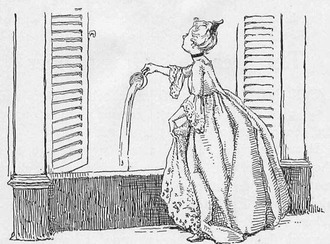
“SUSAN DELIBERATELY TIPPED HER CUP, THROWING THE TEA, UNTASTED, ON THE GRASS”
“The spirit of the Colonies,” said the Royal Governor smiling. “I foresee that we shall have to tame it.”
But in spite of his mocking words Susan saw that more than one of the guests who claimed the cause of the Colonies their own set down their tea and drank no more of it. The first laughter died away. There was a thoughtful quiet during the remainder of the party.
Years and years ago it was, but the brave rebellion of little Mistress Susan has come down to the children of to-day in story as one of the helps in the winning for America of her independence.
On their way to and from school, the boys and girls of old Boston cast curious glances toward the shop of Deacon Shem Drowne.
It was over one hundred and fifty years ago, and they were Colonial children. The boys wore short coats and long trousers, and the little girls long, plain skirts almost touching the tops of their shoes. When it rained, as it often did in the long chilly days of late winter, they wrapped themselves in heavy capes and ran between the drops, for they had no umbrellas.
But rain, or no rain, Samuel, and Abigail and the others could not pass the deacon’s tiny window. Through it they knew they might have a peep at his strange craft. Even the sound of his hammer thrilled them.
He was a coppersmith of old Boston, and his shop of one room was down near the wharves where British ships lay at anchor and the fishermen plied their trade all day. On Sundays Deacon Drowne went to the white meeting-house on the Common and passed the contribution basket, and rapped the head of any child who went to sleep during the sermon.
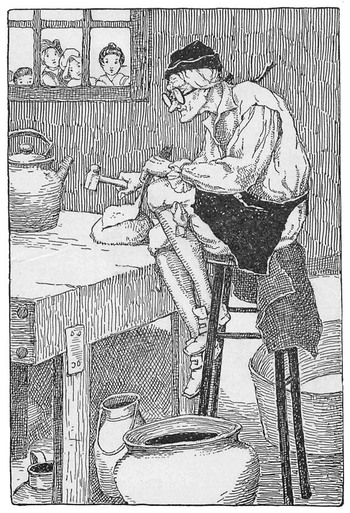
“HE PERCHED HIMSELF UPON A STOOL BESIDE HIS WORK BENCH”
When Monday came, though, the Deacon was a very different person. He put on a little round cap and a short leather apron. He perched himself upon a stool beside his work bench and chuckled like some little, wizened gnome of the mountain as he looked at his sheets of copper and brass, his scissors, dies, and the many hammers, large and small, that he used for shaping metals.
The trade of a coppersmith was not one to interest children greatly in those days. The Deacon had to patch some housewife’s preserving kettle, or make copper toes for the shoes of a little Colonial lad who had worn out the leather too soon to suit his father’s sense of economy. Sometimes he had a clock to mend, or a teakettle that needed a new handle.
None of these were unusual enough tasks so to attract the boys and girls of Boston. They were familiar with teakettles, having to fill them so often, and copper toes on their shoes hurt their feet. It was something quite different that drew them to the window and door of the coppersmith.
“What do you suppose Deacon Drowne will have hidden under his work bench to-day?” Samuel would ask.
“Oh, I do not know. I am curious to see. Is he not a person of great skill and many surprises?” Abigail would reply.
It was quite true. The old coppersmith saw possibilities in his craft that would have amazed his patrons who thought that the Deacon’s mind was bent all day long on patches and wires. When his day’s work was over the old coppersmith closed his shutter and lighted a candle. He lighted, too, a small stove in which he could heat his metals and weld them into queer and curious shapes. It seemed to him that the sheets of copper and brass in which he worked were too beautiful for the commonplace uses to which he had to put them.
His mind went back to the days of his boyhood in England when he lived on a farm near the sea and could watch the ships beyond the fields where the sea lay, blue and clear. As these thoughts came to him, he welded his metals to make the figures that his memory painted for him. No wonder the children were excited at what the coppersmith would show them that he had made over night!
He would beckon to them to cross his threshold. Then, with his eyes twinkling like stars through his spectacles, he would hold up in triumph something that he had made. Once it was a little brass rooster, shining and beautiful from his comb to the last tail feather. Once the Deacon showed the children a curious little admiral made of copper and holding a telescope as he looked far off at an imaginary sea. Then, to please them, he made a small Indian of copper; the figure was complete even to the feathers in his headdress.
How the children did laugh, though, when Deacon Drowne showed them a copper grasshopper that he had welded! It was so much larger than a real grasshopper that it looked like some strange dragon. It quite filled the tiny shop, its long slender legs stretching in every direction.
“Why did you make it?” the children asked.
The old coppersmith chuckled as he replied.
“To show what can be done with my shining metal,” he said proudly. “It took skill to bend those legs and make the veins in a grasshopper’s wings.”
“What will you do with it, Deacon Drowne?” asked the children.
The old man shook his head.
“Perhaps it has no use,” he said, looking sadly at the copper grasshopper sprawled out before him.
That was what the sober people of Boston thought, too, all except Mr. Peter Faneuil.
No one could quite understand Mr. Peter Faneuil. He had inherited quite a fortune, but he lived in a simple way and was fonder of children and the sea than of wearing fine broadcloth and having a coach. He joined the children one day when they went to Deacon Drowne’s shop and he saw the grasshopper. They had thought that Mr. Peter Faneuil would laugh at it. He did not even smile. He looked at the shining copper wings and the delicate workmanship of the slim legs. Then he grasped the coppersmith’s toil-hardened hand.
“It is a wonderful piece of work,” he said. “It ought to be placed where every one in Boston could see it.”
The Deacon smiled with happiness as Mr. Faneuil and the children left him. He touched the grasshopper’s perfectly shaped head.
“How could that be?” he said wonderingly.
The years went on, and at last no one heard Deacon Drowne’s hammering, for he was too old to work any longer at his trade. The children grew up, and Samuel graduated from Harvard College. He was called Samuel Adams now, and was quite an influential young man in Boston. He was one of those called to attend a meeting in Boston at which an important decision was to be made.
Should, or should not Boston accept a gift that Mr. Peter Faneuil wished to make the city from his boundless wealth? He wished to build for Boston a public hall. But this was the unusual part of his wish. The hall was to have a market on the ground floor where the incoming ships could display their fruits and tea and cloth, and the housewives of Boston might come and buy. On the top of the hall there was to be a high tower, and on top of the tower a weathervane that the sailors could see at quite a distance from shore.
“Where shall we transact our important business in this hall?” the meeting asked Dr. Peter Faneuil.
“Over the market,” was his quick reply.
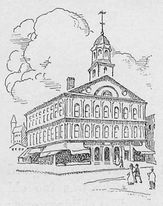
FANEUIL HALL, BOSTON
Then they argued the question and wrangled about it. A market in a public building did not seem fitting to them, even though there was no public market in Boston at that time. Neither did a weathervane on top of the tower seem suitable. Some were for it, and more were against it. It did not matter that the hall was to be a free-will gift to Boston. They wished no new ideas to break in upon the old ones that belonged to England and the King.
Samuel Adams and his friends were opposed to the idea, but suddenly Mr. Peter Faneuil sent a message to Samuel that made him smile and change his mind. The meeting closed, and the day was carried for Mr. Peter Faneuil. He was to build his hall just as he wished, and give it to Boston.
Every one watched it with great excitement. It looks a low, humble enough building now, but it seemed quite huge to old Boston. The people who had been opposed to it grew to like it when they realized how much they had needed a market. The magistrates and other officers of the town found that they could hold their meetings quite as well over the market as downstairs. They could come down and help their good wives carry home the day’s dinner when they had finished with more weighty matters.
Every one liked the weathervane. It could be seen for a long distance on land or sea, and its arrow never failed to fly north, south, east, or west. At first all Boston was puzzled by the figure on the top of the weathervane. It was different from any that they had ever seen. Persons came from a distance by stage-coach to see it. It shone and glittered in the sunlight.
“Who wrought it?” the people of Boston asked, and when they found out, the maker was acclaimed as almost a hero.
Patient old Deacon Drowne! He lived long enough to look up through his spectacles and see his great copper grasshopper perched on top of the weathervane of Faneuil Hall.
The grasshopper is there to-day. It has been on Faneuil Hall since 1742. It saw the Boston Tea Party, and heard the shots of the Lexington farmers. It heard the hoof beats of Paul Revere’s horse, and the splash of the oars of the British troops, rowing into Boston Harbor. It watched battle and ruin, and then saw the coming of peace and plenty again.
Thousands of storms have beaten against its copper wings and legs, but the good workmanship of the old smith has helped the grasshopper to stand them all. It has been replated and strengthened in places, but the main part of the figure remains just as Deacon Drowne made it, an emblem of the humble, but preserved for almost two centuries in beautiful workmanship.
“Count your threads, Patience, child. You will do well to give better heed to your sewing than to the window. Methinks your eyes have been following the garden path over often the last half hour, and your work has suffered the while.
“Why, when I was a lass in Devon I had stitched six samplers before I was your age; and one of them had the entire Lord’s prayer upon it embroidered in letters of red so small that your grandame had to don her spectacles in order to spell it out.
“Ah, well, the girls of to-day are catching the spirit of the times—revolt against the old order and small patience with the new. I must be off, Patience, and across the orchard to Mistress Edwards’ with a bowl of curds. She has a mind that they cure her gout. Do you attend your work while I am gone. The sampler is almost finished. I can read the text at the top in spite of its crooked letters, dear child:
“‘A Soft Answer Turneth Away Wrath.’
“Here are all the letters of the alphabet, too, and now it remains only for you to embroider your name in the cross-stitch. Measure your stitches with great care, for you will likely begin it so near the border that you will have small space left for Arnold.
“I shall be back by tea time.” Mistress Arnold stooped to touch with one thin, white hand, stripped of all its jewels, the bowed, brown head of the little girl who sat by the window sewing.
“If you finish the sampler by five o’clock, you may go out in the garden and play. Oh—”
Mistress Arnold turned in the doorway, and pulled from the green silk reticule which hung at her side, a long iron key.
“I will leave the key to the barn in your charge, Patience, and on no account give it to any one until I return. Your father tells me that his store of powder and shot is increasing daily, and we are likely to need these before long.”
Mistress Arnold sighed as she stepped over the threshold and took her way—a tall, straight figure in gray crinoline—between the pink clouds that the apple blooms made, and then out of sight.
Small Patience Arnold, a little brown-eyed lass who had seen eight summers in the quaint, white-walled town of Lexington, watched her mother. Then she leaned back in the stiff, wooden chair that was so much too high for her, drawing a weary little sigh. It was very dull, indeed, and stupid to stay in the bare kitchen. All outdoors, the first bees, the robins, and the perfume of the apple trees called her. Oh, if she might only drop her sewing to the floor, and run out to the garden, darting in and out among the trees like a bluebird in her straight frock of indigo-dyed homespun. If she might only sing in her sweet, clear voice, above the hum of bees and birds, the songs that her mother knew—the songs of merry old England where every one was happy, and everything was gay!
But, no, she must not go. There was the square of rough cloth in her hand, and the sticky needle, and the thread that would knot in spite of Patience’s care. Every little girl in Lexington had finished a sampler, and some of them two, by the time they were nine. She must hurry, for the afternoon was wearing away. Soon the sun would drop behind the orchard. Such a long name it was to sew—Patience Arnold.
Patience took up her needle again and began to count the stitches and embroider the letters, P. A. T. There were so many of the letters, and they were very crooked, for all the world like the new minutemen whom her father drilled on the village green when it was dusk. No one saw the minutemen march and countermarch, and no one could hear their feet in the soft grass. Patience laughed to herself, a merry little trill of a laugh, as she bent over the letters of her work.
“You are Mistress Anderson’s lad who has such long legs and thinks he will be the captain of the militia some day.”
Patience pointed to the A.
“And you—” She put her needle in the T.
But a long shadow lay across the doorsill. There were other shadows on the grass outside. Where had they come from? Why, the orchard was full of soldiers. One stood, even now, in front of Patience—a most gallant gentleman in scarlet broadcloth and gold lace, holding his cocked hat in his hand and smiling down at the little girl.
“So the bumpkins of this little town of Lexington, too, have taken upon themselves the gentle art of soldiering. It is high time that his Majesty interfered.”
The man seemed to speak to himself. Then he bent so low over the little girl in her straight-backed chair that the gilt fringe which dangled from his epaulets brushed Patience’s cheek.
“Such a pretty little lass, and so industrious, as she sits alone in this great house—”
He paused, watching Patience’s trembling little brown fingers. She was frightened by this emissary of the King. Then he continued, “I would ask shelter for my men.”
He pointed to a score of soldiers in red coats who swarmed the dooryard now, laughing, brawling, and trampling on Mistress Arnold’s beds of savory herbs.
“The day is warm, and we have had a long march from Boston town. I would that my men might lie and rest a space on the cool hay of your barn, my little lady. We have tried the door, but we find it barred, and the key is missing from the padlock. Will you give me the key, little maid?”
Patience bent lower over her work as the last words came from the man’s lips. Reaching in her homespun pocket for the key which her mother had given her, she clasped it in her hand and held it underneath the sampler as she stitched the letters once more. For a second she did not speak. It seemed as if her throat was burning. Her lips were dry with fear. Then she looked up, smiling a wistful little smile.
“No, kind sir. I can not give you the key.”
“Oho, so the little lady is stubborn.”
The man crossed to the door and motioned to the waiting soldiers outside. In a second they had obeyed his summons, swarming Mistress Brewster’s clean kitchen and covering the spotless floor with the dust of the high road.
“Search the house!” commanded their leader. “Yonder stubborn girl is tongue-tied, and stubborn. She will neither give up the key, nor tell me where it is. Overturn the chests of drawers; tear up the carpets, break down the doors, spare nothing, I say, but bring me the key of yonder barn.”
No sooner were the words spoken than the work of pillage began. Sounds of doors and hinges wrenched from their places, the tramp of rough boots on the floor above her head, the rattle of chests told the frightened little Patience that the work of searching the house had begun. It seemed to her that the key would burn its way straight through her palm, so hot it was. Her hands trembled, and her eyes filled with tears so that she could scarcely see her needle. But still she stitched, never leaving her chair, nor lifting her white little face.
The soldier who had given the command remained in the kitchen pacing restlessly up and down, his arms folded, and a frown deepening on his forehead.
“P. A. T. I. E. N.”—Patience was nearing the edge of the sampler, and it was with difficulty that she stitched because of the key that lay underneath the cloth. The letters were, indeed, crooked and straggling, and lacking the precision of even those that spelled the text. There was no sound in the room, now, save the ticking of a tall clock and the tread of the soldier’s feet.
Suddenly the soldier in command stopped in front of Patience’s chair and laid a heavy hand on her little bare, brown arm. He spoke, and the words were full of anger.
“Enough of this nonsense! Give me the key, I say. I will have it!”
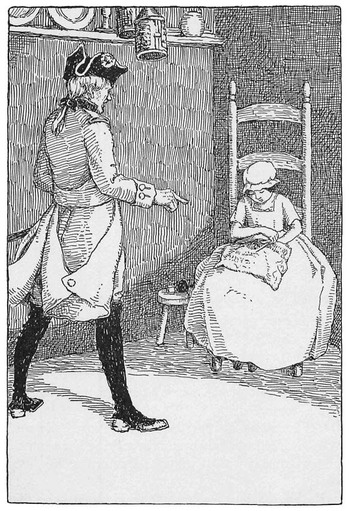
“‘GIVE ME THE KEY I SAY’”
Patience slipped out of her chair and down to the floor, holding her sampler, covering the hidden key, as high as the man’s eyes. He loosed his grasp upon her arm, looking at her in wonder. Such a little lass, in her straight blue frock, and not as tall as his own little girl in England. She had the same soft eyes, though, and the same low, sweet voice.
“I would gladly give you what you wish, sir,” she began bravely, “but I promised my mother I would deliver the key to no one until she returned. Look!” She held the sampler still higher. “I am stitching my name. Is it not a stupid task on such a pretty day?”
“A soft answer turneth away wrath.” The man read the text at the top of the sampler. Then he looked out of the window and farther than the apple trees.
“It is indeed neatly stitched, little lass,” he said. “My own Elizabeth is even now making her sampler, and wetting it with tears until I return to her, overseas.”
He gave a quick command to his men, who filed down the stairs, empty handed, and into the garden. Then he raised his hat in salute, and followed them as they marched slowly down the road and farther than Patience could see.
“My little girl—my Patience—are you safe?”
It was Mistress Arnold who ran across the orchard and into the kitchen, clasping the trembling little lass in her arms. “We saw the red coats from Mistress Brewster’s window and knew that they had been here. But you are unharmed—and the guns—the powder?”
“I spoiled my sampler, mother,” Patience gave a sobbing laugh as she held up her work with the crookedly stitched ending, and the unfinished name. “It is as you feared. I started my name too near the border and there is no room to finish it, but”—she held out the precious bit of iron, “here is the key.”
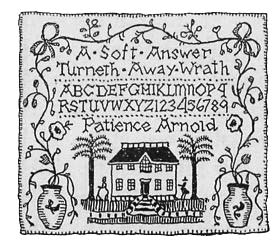
From Tabitha Wells, aged ten, at Philadelphia, in the year 1776, to her cousin John Bradford, at Boston—a letter.
“My Dear John:
“It does seem more than a month ago that I said good-bye to you, and you took your long journey home again. Your visit was a bright spot in these troubled times. Do you remember the pair of robins that we watched building their nest in grandmother’s old apple tree. They have raised their brood of young ones now and the little birds have flown away. The old birds still live in the apple tree, though, and each day at sunrise and sunset they sing as if all the world were gay instead of fallen into this sad Revolution. And the early apples are as red as the coat of a British soldier and are dropping all over the grass of the garden.
“Grandmother gave me a pewter canister that used to hold tea—she knew it would be a long time before we have any more tea to put in it. I have filled it full of apples, one layer of fruit and then one of leaves to keep them from bruising. It is as sweet smelling as our garden, John, where you played with me so many happy days this spring. It is for you; the apples shall go to you by the next packet.
“But here I am writing you of such everyday matters as robins and apples, and wasting paper which is rising in price, and using up one of my grandfather’s best quill pens and his ink stone. I had other things in mind to tell you, John, when I started this letter—things of far greater importance.
“Strange happenings have come to your cousin Tabitha Wells in Philadelphia since she said goodbye to you, John. I feel as if I, a little girl of only ten summers, and not as learned as I should be, were of a part with these great and stirring times in the Colonies.
“To wit, as the barristers say. And now, my dear John, I will tell my story.
“I mind that we played so much at home when you visited me, John, that I had no time to take you to the little upholstery shop on Arch Street, near grandmother’s house, which is my special delight.
“It is kept by one Mistress Betsy Ross, not much more than a grown-up girl. They say she is little past twenty in years, and she has a great pleasure in letting me visit and watch her at work. Her husband was a brave young patriot of our Colonies and was but a brief space since killed. Mrs. Betsy always helped him in his shop and now that he will be there no longer, and she being most skillful with her needle, she is carrying on the work of the shop herself.
“When I have finished wiping the dinner service for grandmother, I often ask leave to go down for the rest of the afternoon to the shop of Mistress Betsy. I mind that we are both of us lonely; I, the only child in so quiet a house as this in which my father left me when he joined the army; and she a slim, sweet lady, all alone in her shop.
“Such pretty stuffs as she has, John! If you were a girl your eyes would stick out for envy, and your fingers ache for scissors and needle. She gave me a bit of yellow satin brocade, picked out with a pattern of butterflies. I made a court dress of it for my wooden doll—although grandmother says such finery is not for a doll even in these days.
“But here I am letting my quill go wandering again, John. It is not of my doll that I am minded to write you, but of the important thing that happened in the shop of Mistress Betsy Ross this summer time. I was there, John. I saw it with my own eyes.
“Mistress Betsy was fitting new covers to grandmother’s best fiddle-backed chairs, and I had come down to her shop to see if they were done. It chanced that they were, but I lingered a while for Mistress Betsy was busying herself at what she likes best to do. She was stitching a flag.
“You know, of course, John, that each of our American Colonies has its own flag, each of a different design, although they all favor the same colors, red, and white, and blue. Such days as these, when troops are marching to war, there is need of many flags, and so Mistress Betsy is as busy stitching them as she is in making her furniture covers. So quick and deft, she is, John.
“I wish you could but see how neatly she sews together the colors, and stitches on the designs. No scrap of cloth is wasted, and each flag that Mistress Betsy makes is quite perfect in shape and pattern. I mind that the packet had just brought Mistress Betsy some bundles of fresh stuff for her flag-making, red and blue, and she was looking it over as she spoke to me:
“‘Tabitha, child,’ Mistress Betsy said to me, ‘it would save me much time and work if I had one pattern for a flag. It tries my patience sorely to keep in my thoughts and at my fingers’ ends the patterns of thirteen.’
“‘So think I.’ The voice of a man surprised us, and we looked up to see a very grand gentleman standing in the door of the shop and looking at us. ‘I heard your speech just now, Mistress Ross,’ he said, ‘and it is even upon such an errand that I come to you. The Continental Congress is of a mind to adopt one flag that will be the flag of freedom and the emblem of the brave; one banner for the Colonies. The fame of your fine needlework has come to our ears, Mistress Ross, and we are here to consult with you in the matter.’
“The gentleman, very fine indeed in his blue broadcloth and gold lace, stepped into the little shop now, and behind him were other gentlemen in the uniform of the Colonies.
“I confess, John, that I was a bit awed, and I hid myself behind Mistress Betsy’s tall clock, where I could hear but not be seen. You see I was in my linsey-woolsey frock, not dressed for company. Mistress Betsy wore her long working apron over her chintz short gown, but she curtsied with great ease.
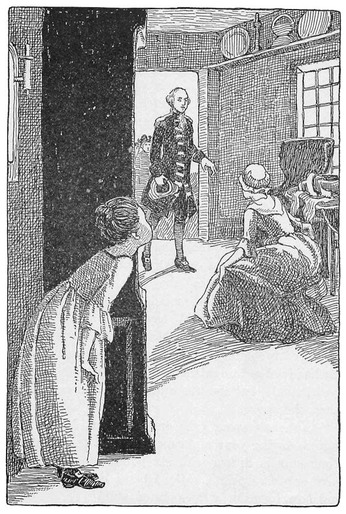
“‘I COULD HEAR BUT NOT BE SEEN’”
“‘You honor me, Mr. Washington,’ Mistress Betsy said. ‘I have been long of a desire to put my needle into one flag, and one only. What might be your wishes and that of the Congress in the pattern of this flag?’
“So this was the great Mr. Washington! My heart went pit-a-pat, John, as loudly it seemed to me as sounded the ticking of the clock. I tried to hold it quiet as I listened to Mr. Washington’s every word.
“‘We have not made any fixed design for an American flag, Mistress Ross,’ Mr. Washington said. ‘We feel that all the thirteen colonies should, in some way, have notice in it, and I have a great desire that there should be stars.’
“He took a quill from Mistress Betsy’s secretary and began making drawings on a piece of paper. Mistress Betsy looked over his shoulder and watched his long fingers, trying to see what manner of a flag he was designing.
“‘See, Mistress Ross,’ Mr. Washington said, ‘I should like stars like this one.’ He held up his drawing.
“Mistress Betsy took the drawing and looked at it, turning it first one way, and then the other. I came out from behind the clock and looked, too, for I was of a curious mind about this new flag. Oh, John, if you could have seen the strange, crooked star that Mr. Washington had drawn! He is a great soldier and statesman, without doubt, but he is not a draughtsman. I saw Mistress Betsy’s eyes twinkle, but she was quite sober and respectful when she spoke.
“‘You have your eyes on your men, Mr. Washington, during your night marches, not on the stars. Your star is drawn with six points, and it should have only five points. May I be so bold as to show you how to make a five-pointed star?’
“Then Mistress Betsy picked up a scrap of white cloth, folded it deftly into five parts, made one snip with her scissors and opened it. There was a perfect star with five points!
“Mr. Washington took it, and as he looked at it his stern face changed, and he smiled. Then he bowed as he turned to go.
“‘Well done, Mistress Ross,’ he said. ‘I have the idea of an American flag in my mind, but you have it in your fingers. Put your wits to the task of designing a flag to submit to the Congress, and I hope that the Colonies will see fit to adopt it. Good afternoon, Mistress of Flags!’ and Mr. Washington and his gentlemen had gone.
“Oh, John, how excited we were then! Mistress Ross took my hands in hers and she danced like a girl with me about the shop. Then she sat down in her big wooden rocking chair and took me in her lap. She put her arms around me and pulled my head close to hers. I thought she was going to cry as she spoke:
“‘Tabitha Wells,’ she said. ‘The chance has come to me to do something for my country. My husband died for the Colonies, but I, who must live, may perhaps make the flag that will wave in remembrance of him and of all the other patriots!’
“And I, knowing how she felt, could only hug her, not speaking because of a great choking in my throat.
“But we soon realized that it was not a time for tears, but for doing. Mistress Betsy jumped up, and thrust her hands deep into her colored stuffs.
“‘Only three colors for the flag of our country, Tabitha,’ she said, ‘red for the blood of her patriots, and blue for her truth, and white for her purity. But now, for the design?’ She laid the pieces of cloth together and tried them this way, and that.
“Oh, how we puzzled our minds, John, over that flag. Or Mistress Betsy did, while I looked on, and clapped my hands in pride for her. I forgot the time. It grew late, and grandfather had to come for me, but I went again the next day to Mistress Betsy’s shop, and for many days to watch her plan the pattern of our one flag.
“You see, my dear John, it was no easy task. Mr. Washington had said that he was of a mind to have the thirteen Colonies represented in it. Mistress Betsy, herself, was always of a mind to make her needlework good to look at because of its simplicity. So she cut, and stitched, and ripped, and then stitched again. It was a weary work and lasted through the burning of many candles, but at last Mistress Betsy finished her flag.
“Oh, John, if you could but see it! It is plain, which the better shows its bright colors of red, and white, and blue. It has seven long red stripes and six long white stripes, making thirteen in all, for the thirteen colonies. As I look at the stripes they mind me of the long way our Colonies are taking to their freedom. Then, in one corner of the flag is a large piece of blue cloth, and sewed to it with Mistress Betsy’s tiny stitches are thirteen stars. The stars are for our Colonies, too. Like stars, they will shine.
“And now comes the amazing part of this letter, which has tried you, I fear, with all its quill scratching. Mr. Washington is so greatly pleased with Mistress Betsy’s endeavor to carry out his wishes that her flag is to be adopted by the Congress. It will be our American flag forever, and ever. I, Tabitha Wells, know the sweet lady who made it. I can scarcely wait for my father to come home to tell him about it. The flag of our Union, John, and made here in Philadelphia and in the shop of my Mistress Betsy. I am going to call her my Star Lady after this.
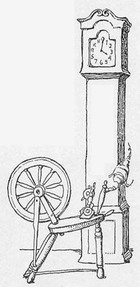
COLONIAL SPINNING WHEEL AND CLOCK
“Your patience has been tried, dear John, I fear, in reading this long letter. I have had trouble with my quill, which would not travel over the paper as fast as my thoughts come. I hear that you are having stirring times in Boston, and I pray that you are safe, and well. I shall count the days until your letter comes.
“As soon as I can I will have a small flag made for you in the Star Lady’s shop. Perhaps I can send it by the same packet as the apples. So, you will remember Philadelphia well, John, by the fruit of our garden and by the first American flag.
“Your cousin,
“Tabitha Wells.”
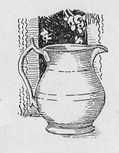
Prudence looked up from her sewing. It was a pleasant place to work, out there in the morning sunshine that trickled through the big white pillars of the broad piazza. The wide street was overarched by the leafy branches of the spreading elms, but the houses that lined the streets were strangely empty of life.
It was in Philadelphia in the long, long-ago time of the Revolution. Prudence was a quaint, demure little Colonist girl. In all her eleven years she had known nothing save the daily routine of the simple home; the scouring of floors, the polishing of copper kettles and brass andirons and mahogany chairs, the making of huge loaves of bread and yellow butter and round cheeses, the bleaching of linen, and the patching together of gay blocks of colored cloth to make log-cabin and morning-star bed quilts.
Sometimes there was a quilting bee or donation party at the minister’s to attend. These, with their feasts of rich preserves and pound cake, and the children’s table set after the grown-ups had finished, were wonderful parties for Prudence. Usually, though, her days were very much alike. She helped her mother and studied her lessons from school books in queer wooden covers, and stitched her sampler when the studying was done.
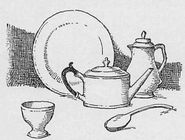
COLONIAL SILVER
It was not a cross-stitch sampler, though, that Prudence was working on so busily now. Her needle flew in and out as she stitched together with even small stitches some long straight strips of red calico and white cotton. In her lap lay some star-shaped pieces of plain white cotton calico. The edges were neatly turned in and basted ready for sewing upon a square of blue calico cloth that Prudence had just cut.
“Put up your work! It’s too pleasant a day to sew.”
Prudence looked up and saw a boy standing in front of her—her neighbor, William Brewster. The hair of each of these little Philadelphia children was cut short and square. They had the same round, rosy faces. Prudence’s short-sleeved, short-waisted frock and William’s ruffled shirt were both cut from the same cloth. It was green and white checked gingham from Deacon Wells’ store. From beneath William’s long trousers and Prudence’s skirt showed the same stout shoes with copper tips on the toes.
William ran up the steps of the piazza and pulled Prudence’s sewing.
“Oh, William!” Prudence gasped. “Be careful; you’ll soil the white cotton I fear. What ails your hands? I never saw them so stained before in all my life.”
William dropped down on the top step and held up his two brown hands in the sunlight, laughing merrily.
“You are indeed right, Prudence,” he said. “My hands need a dose of my mother’s good soft soap, but”—the boy’s voice dropped to a whisper—“all this morning I have been busy digging holes in the orchard.”
“Why?” Prudence’s blue eyes were wide with wonder. William got up now and looked all about him to see that no one was listening. Then he whispered in Prudence’s ear.
“For burying the silver,” he explained. “We packed it all in a strong box; my grandmother’s teaspoons, the silver cake basket with the design of strawberries around the edge, and the sugar tongs. We buried them all; oh, very deeply.”
“Was it necessary, William?” Prudence’s eyes were frightened as she spoke. “I know that my mother, before she had to take to her bed with the ague, planned to hide our silver in the well that is dried out. Are—are the Red Coats coming through Philadelphia soon?”
“They do say that they are coming. I am very fearful,” William answered. Then, as Prudence’s pink cheeks grew a little pale at the thought, the boy pointed to her sewing.
“What are you stitching, Prudence? Surely you are not going to dress yourself in these gaudy colors? It would scarcely be right in these hard times.”
Prudence laughed, shaking out the strips of scarlet and white that filled her lap.
“No, indeed, William. Dark colors and plain frocks must be worn by us children of the war. I am making a flag. Our great, beautiful stars and stripes of the Colonies went to our regiment with father and your brother John. But I went down to the flag shop of Mrs. Betty Ross not long ago, and I stood awhile on the threshold, watching how she and her maids cut and sewed their red, white, and blue cloth together. I said to myself, ‘why not make your own flag, Prudence Williams? You have ten fingers and a piece bag up in the attic.’ And here it is, all done but sewing on the little white stars.”
“Oh, Prudence!” William’s eyes shone.
“It is wonderful! How did you ever measure and sew it so well? I always did say that you are the most clever girl with your needle of any in town.”
“It is carefully made,” Prudence assented, “but that is because I thought of my regiment with every stitch. And I wished that I might march in the regiment beside my father, waving my flag, and shouting for the independence of our dear Colonies at every step. Oh, it is hard, William, to be a girl in this time of the Revolution, with nothing to do but sit at home.”
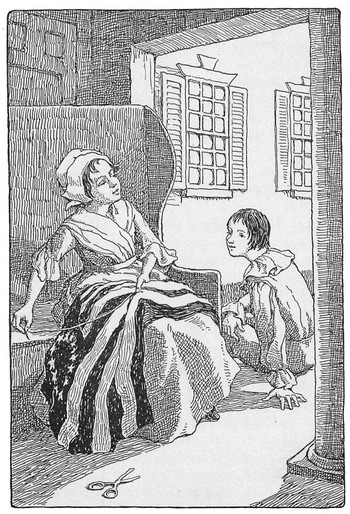
“‘IT IS HARD, WILLIAM, TO BE A GIRL ... WITH NOTHING TO DO BUT SIT AT HOME’”
“That it is,” William said, “but now let’s go in the house and delve in your cooky crock, Prudence. Perhaps your cook has filled it with her good caraway cakes,” and the two little neighbors disappeared through the great white door of the old house.
In the days that followed, Prudence quite forgot to dread the coming to Philadelphia of the British soldiers. Rumors came of how the Red Coats had marched through the near-by towns and countryside. They had taken possession of the homesteads, appropriated the supplies that had been left for the women and children, and plundered the treasures of silver that were almost all the wealth of the Colonists. News of this reached the ears of those who remained behind, alone, in Philadelphia. But Prudence paid little heed to the rumors. Her mother was better, but still an invalid and confined to her room. There was only one maid servant to do the work of the large house, and Prudence found herself a real little housekeeper with her hands very full. All day long she tripped up and down the wide oak staircase, with instructions from her dear mother to the maid in the kitchen, and then helped to carry them out. She had finished the flag. It was laid away in a drawer.
“It’s hardly safe to fly a flag from your piazza, Prudence,” sensible William had warned. So Prudence opened the drawer only when she had a little spare time. Then she would kneel down on the rag carpet in front of the drawer and hold the beloved Stars and Stripes tenderly in her arms.
“I love every star, and every color,” she would say to herself. “Oh, may God win the battle for us and help to give me back my father, and William his brother John!”
The next morning, when Prudence set the tray with her mother’s breakfast, she laid it with unusual care. Upon the sun-bleached linen cloth stood the thin china dishes, white with a pattern of raised bunches of grapes in purple and green. The silver spoons and forks were arranged neatly. Prudence’s mother, sitting in a big arm chair by the window where the sweet odors of the garden roses were blown up to her, looked lovingly at her small daughter.
“You are a good little housewife, my dear,” she said. “I don’t know what I should have done without you. Father will find his little girl almost a little woman when he returns.” She paused a moment, lifting one of the silver spoons to break the end of her eggshell. “If he ever does return,” she sighed. “Oh, I should have hidden the silver weeks ago.” The sound of a muffled drum struck her ear. She looked at Prudence in terror. “Pull the curtains close, child, and lock all the doors. The Red Coats are coming.”
Like a line of fire taking its winding way in and out between the houses, the regiment of British soldiers streamed through the streets of Philadelphia. Here, it stopped as an officer and his men stripped the fruit from some peaceful orchard or garden. There, at an officer’s order, a group of soldiers entered a house, and returned with bits of old family treasure that war gave them the privilege of taking.
Prudence’s heart beat fast, but she tried to be brave. She ran from room to room, stowing away the silver candlesticks and tableware, closing blinds, and locking doors. The old maid servant, her apron held over her head, had fled to the cellar in her fright. Her mother, bravely directing Prudence, was still unable to leave her room. Suddenly the front door burst open and in came William.
“I couldn’t bear to leave you alone, Prudence,” he said. “See, I brought my father’s old drum, thinking we could make a little noise on it and scare the Red Coats.”
Prudence looked into the brave face of her little neighbor.
“You’ve given me an idea, William,” she exclaimed. She ran over to the chest of drawers, opened one drawer, and pulled out the little homemade flag.
“We’ll both scare the Red Coats,” she said. “We won’t fasten the doors, for it wouldn’t be of any use. The soldiers could very easily break the bolts and I can’t find any safe place to hide the silver. Come. We’ll go right out on the piazza and meet the whole British army if it comes!” She clutched William’s hand, and tugged him toward the door.
“Do we dare?” William’s round, merry face was very sober.
“Of course we dare. Come on. You drum and I’ll wave the Stars and Stripes,” Prudence said.
The Williams’ white house, set a little back from the street in the midst of sweet old flower beds and low hedges of box and yew, looked like a prize to the ruthless Red Coats. It was well known in Philadelphia at that time that Prudence’s father had used much of his wealth to further the cause of the Colonies. This made the invading enemy hate him. It was a common rumor, too, that although the Williams’ chests of gold were greatly depleted, there was still much treasure of silver left in the home. News of it passed from mouth to mouth of the soldiers.
“There’s the house. Left flank, wheel, Halt!” shouted the British general in command. He turned in at the Williams’ gate and strode up the path. At the steps he looked up and stopped. “Gad!” he said, “the children of these stubborn Colonists would defy us, too,” but a smile took away the stern lines from his mouth.
On the top step of the piazza stood Prudence and William, two brave little Colonists. William was beating a loud, rap tap, on the cracked head of an old drum. Prudence, her arm held high above her head, waved the little home-made flag that showed the glorious stars and stripes of their regiment.
“You mustn’t come a step farther, sir!” she commanded.
“No indeed!” echoed William. “We won’t let you come in.”
“So you’re holding the fort, are you?” the General asked.
“We have to, sir,” Prudence explained. “My father is with the army of the Colonies and my mother is ill. This is my neighbor, William Brewster. He came over to help me guard the house.” Then she turned pleading eyes toward the great man as she held out her flag.
“It looks to me as if there were a thousand Red Coats, sir, more or less, out there in the road. There are only two of us. Please, sir, for the sake of our flag, march on!”
Was it dust or the mist of tears that made the British general wipe his eyes? He reached out one ungloved hand and grasped Prudence’s little one.
“Give my sympathy to your mother, my child,” he said kindly, “and tell her that I hope she will soon be better. Little soldiers, remember that never before have I surrendered, but now I do, in the name of the King. March on!” he ordered to his men. Looking back he saw Prudence and William standing in the gate and waving him good-bye until the trees and the distance shut them from his view.
“I saw Painted Feathers this morning,” the boy said as he threw himself down on the rude log settle in front of the fire and stretched out his hands to feel the blaze. “He seemed angry about something,” he went on, “but he and the young braves were glad to see me. They like us, mother. Painted Feathers remembers how you took care of his little daughter, Laughing Eyes, when she strayed away from the camp up in the Blue Ridge, and he still wears the beads you gave him around his neck. Heap big chief, Painted Feathers, but I guess we’ve made him our friend.”
The woman in homespun, who bent over a savory stew brewing in a kettle that hung from the crane, smiled as she looked down at the boy’s manly face. He was the counterpart of his father, who had gone over the Blue Ridge hunting, and had never returned—lost in the trackless wilderness of the woods, they feared. He wore the same kind of rough suit of tanned skins, hide boots, and fur cap. His eyes were just as deep and fearless as his father’s had been. He was his mother’s mainstay now in the little cabin set so far from any other habitation in the depth of the wilderness. There were Indians near, but, so far, they had been friendly to the two settlers.
“I tried to understand what Painted Feathers was angry about,” the lad continued.
“What was it, Eli; nothing that we have done, I trust?” the boy’s mother asked, her voice trembling a little as she peered out through the window at the gathering dusk and the gloomy forest that surrounded them.
“Oh, no, mother,” Eli hastened to assure her. “As nearly as I could make out, Painted Feathers and the tribe are afraid of losing their land. They pointed toward the direction the Shenandoah takes, beyond the Blue Ridge as it flows into the Potomac. They say that the land in that valley is being measured off with strange instruments and by white men who are going to bring their own tribes and build their own camps there. You can’t blame Painted Feathers, mother, for his tribe settled here first. I thought as I came home what a pity it would be to take the land away from the Indians; such lofty trees, and the silver river, and the buds of the wild flowers opening everywhere. I never saw the mountains look so blue as they did in the sunshine this morning, and Painted Feathers has lived here for years and years,” he said, his clear, boyish voice full of sympathy.
“I know, too, how Painted Feathers feels about this valley,” Eli’s mother said. “He knows every deer track and every spring and partridge call for miles around. But I think this is all talk about surveyors being near, son. No one has marked out the lands in all this time, and they would scarcely begin now. How much longer the days are!” she added, turning toward the door to open it and let in the earth-soaked wind of the evening. It was early spring and the twilight was long and mellow.
To her surprise, she found a boy standing outside. His hand which he had raised to knock with went like a flash to his cap. He pulled it off and stood, bareheaded, as he bowed like a young cavalier and smiled up at her. He was about Eli’s age, she thought, between fifteen and sixteen, but a different sort of lad from her sturdy son. His long, pale face had the lines of an aristocrat. Even his slender fingers showed his gentle heritage.
“May I ask shelter of you for the night,” he begged courteously. As he spoke, Eli’s mother noticed that he carried surveying instruments, and his clothing was weather-stained and worn.
“I have come all the way up the Shenandoah and over the mountains, measuring and marking the land, and making maps of its important features,” he said. “I have not slept more than three or four nights in a bed, but after tramping through your wild forests all day, have lain down before a fire on a little straw or fodder or a bearskin like some beast of the wood. And my cooking has been done on sticks over the same fire with chips of wood for plates.” He smiled as he told of the hardships. “I have strayed away from my companions,” he said, “and do not know where to spend the night.”
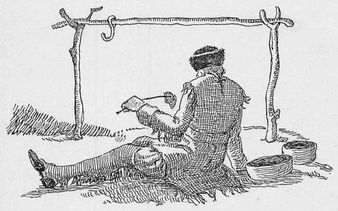
“MY COOKING HAS BEEN DONE ON STICKS OVER THE FIRE’”
Eli, crowding close to his mother in the doorway, had been listening to the tale of the stranger lad with the greatest interest. He pushed open the door now.
“Come in,” he said.
“Yes, you must come in and share our supper, and stop with us in the cabin as long as you like,” Eli’s mother added. And in a few minutes the three were gathered around the rough deal table before the fire, eating bowlfuls of the steaming broth.
“My name is Eli. What is yours?” Eli asked, between mouthfuls.
“George,” said the other lad. “I live at Mount Vernon. Our neighbor, Lord Fairfax, has an estate that is so large it extends way over the Blue Ridge Mountains. Ever since I was a little lad I have ridden and walked with Lord Fairfax, and when he decided to have his estate surveyed, even as far as this distant boundary, I gladly undertook the work. I like this wild life and the adventure of making new paths in the wilderness.”
“Tell me about some of your adventures, George,” Eli begged, leaning across the table, his eyes bright with excitement.
“The narrowest escape we had,” George replied, “was when we made our straw beds on the ground a few nights since and were awakened by smelling something scorched. The straw was on fire, and we were almost burned ourselves.”
“Have you seen any Indians?” Eli asked.
“Not an Indian,” the young surveyor replied. “Indeed, I wish that I might, for I never have seen an Indian in my life. They were long ago driven out of Virginia, you know, by the Colonists. Once, though,” he added, “and not so many days ago, if I remember rightly, we were setting up our stakes about a tract of land near here and we heard a sudden crackling in the bushes. There was a bit of bright color showing among the branches as we looked, like the bright feathers of a chief’s headdress, but it was gone in a moment. It may have been only a scarlet tanager, or a red-headed woodpecker,” he said carelessly.
The words had scarcely escaped his lips, though, when a sudden light flashed against the window of the cabin, lighting like day the scene outside. As scarlet and yellow leaves are whirled in a moment by a sudden gust of wind from a forest, so the thirty or more Indians who surrounded the cabin seemed to have flashed out of the woods—as swiftly and as silently. Painted Feathers led them, decked in fresh war paint, as were all the other braves, and a scalp dangled menacingly from his belt to show that he was bent on warfare. With fierce gestures toward the cabin and the three white faces that peered in terror from the window, the Indians made their preparations. One of the younger braves drummed loudly on a deerskin that he had stretched over an iron pot; another rattled a huge, dried gourd filled with shot and decorated with a horse’s tail. The others built a great fire directly in front of the cabin, pulled blazing brands from it, and danced in a circle with wild yells and whoops.
Eli whispered his frightened explanation to the other lad. “It’s Painted Feathers and his band of braves, and they’re dancing the death dance. When they finish they’ll set fire to our cabin, I’m afraid. He used to be our friend, but this morning he seemed in a great rage about his land and hunting ground being taken away from the tribe by settlers.” Eli’s voice was trembling as he finished. “It wasn’t a wild bird that you heard and saw in the woods when you were surveying, George. It was Painted Feathers watching you, and now he has followed you to our cabin.”
The other lad’s heart beat with terror, but his voice did not falter, as he spoke: “Then I am going out to give myself up to the Indians, Eli. I won’t have your life and that of your mother endangered when you have been so kind to take me, a stranger, into your house, and feed, and shelter me.” He made a quick movement toward the door, but Eli intercepted him.
“Wait, George! It would only satisfy their rage without doing any good. Let me think a moment.”
But as the three waited and watched, the cabin lighted by the fire outside, the seconds seemed hours. The shouting, excited Indians piled more logs upon the fire and fed it with pine knots until the sparks darted in a crimson cloud as high as the tops of the trees. As they danced, they circled nearer and nearer the cabin, their shrieks growing each moment more shrill and menacing. It was time to act if the cabin and its occupants were to be saved. Before either his mother or the boy surveyor could stop him, Eli stepped out in front of the cabin, alone, and unprotected. He stood there, one hand held out in welcome to the terrible Indian chief.
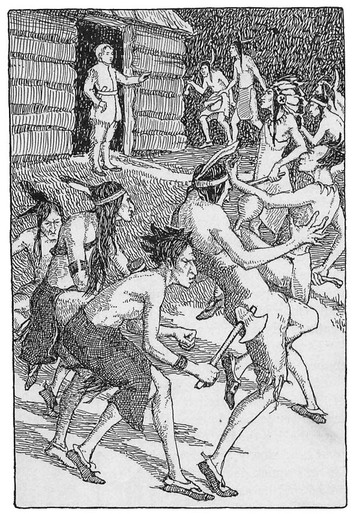
“ELI STEPPED OUT ... ALONE AND UNPROTECTED”
The sudden apparition of the boy was a surprise to the Indians. They were silent for a moment, spellbound by the boy’s bravery, and interested, as well, in something that he drew from his coat and held out in supplication toward Painted Feathers. He had grasped the object from its place on the shelf over the fireplace before he left the cabin. It was a tiny moccasin made of the softest of deerskin and embroidered with bright beads. Painted Feathers drew nearer to look, and Eli spoke to him.
“Laughing Eyes left her moccasin in the wigwam of her paleface friends. We kept the moccasin because we love Laughing Eyes. We found her when she strayed away from the tribe and we gave her back to her father, Painted Feathers, the big chief.”
As the boy spoke, Painted Feathers nodded his great head slowly, and his cruel face softened a little. Eli was quick to see the advantage that he had gained and he acted upon it.
“A strange pale face has come to the cabin. He measures the land in the valley, but he is the friend of the Indians. He will protect their hunting grounds and keep away strange tribes from the west. Will Painted Feathers say ‘how’ to the stranger?” Eli asked, his voice trembling a little at what might be the outcome of his bold request.
Painted Feathers held the little moccasin in his hand now, the touch of it warming and softening his stony heart. Then he slowly nodded his head in assent, stalking nearer the cabin door.
“Come, George,” cried Eli breathlessly. “Come out and meet your friend, Painted Feathers, the big chief.”
In the flaring light of the torches, the great Indian solemnly shook hands with the boy surveyor. Then, as the two boys stood in the doorway, the chief went back to the fire and gave a quick order to the braves. In a second their fearful death dance was changed to the slow, stately steps of a dance of welcome. At its end they put out the fire, and filed silently back into the forest.
Snuggled under bearskins in front of the warm hearth, the two boys slept but little that night, and talked a great deal about their wonderful adventure.
“You needn’t be afraid to go in the morning, George,” Eli assured the boy surveyor. “Painted Feathers’ tribe is the only band of Indians anywhere around here, and now that he knows you are his friend, he won’t harm you.”
“I shall never forget you, Eli,” said George. “You have taught me how to be brave.”
His companions found the lad in the morning and, with many thanks and assurances of his friendship, the young surveyor left the settler’s cabin and started to finish his work and his trip.
More than a score of years passed. Where the trees had grown there was a town now, and the cabin itself was replaced by a comfortable frame dwelling. Eli’s mother was an old lady and he, a man grown. It was a time of much stress for America, the period of the Revolution.
“Great news, mother!” Eli exclaimed as he came in one day. “They say that General George Washington has taken Lord Cornwallis and all his army as prisoners. Yorktown has surrendered, and the war is over.”
“General George Washington?” repeated his mother, her mind going back through the years. Then a thought came to her. “Eli,” she said, “do you remember the lad surveyor who stayed with us for a night when you were a boy? He told me his full name as he was leaving and, all these years, I have never thought to speak of it to you. George Washington, he said he was.”
The man’s eyes flashed. “One and the same,” he said. “The great general, and our guest, George, who had never seen an Indian.”
“Did you hear the news, Dick?” The children on their way to school along the elm-lined street of Hartford caught up with the lad of ten and spoke to him.
“They do say that General Burgoyne and all his Red Coats are marching down from Canada and will fight their way to Albany. Our soldiers are dropping out of the ranks from weariness with this long struggle, and General Schuyler is calling for more recruits.”
“My father is going to enlist in the Continental Army.”
“So is my brother.”
“And my father too.”
The lads and lassies in their homespun and calico drew themselves up proudly. They loved this fair, green land of America with its fields of yellow corn and orchards of ruddy fruit. They loved its blazing fireplaces, the games on the Common, and the brave, ragged army of farmer soldiers who were trying to free the Colonies.
“Do you know what General Washington says about us?” Abigail, a quaint little girl in a long frock and pinafore said, touching Dick’s sleeve. “He says if all the states had done their duty as well as our little State of Connecticut the war would have been ended long ago. But of course that doesn’t mean us, Dick,” she added. “There’s nothing we children can do for the Colonies.”
Dick drew himself up proudly. Although he was but ten years old he was as straight and held his head as high as a soldier. He looked down the street toward a big white house with the Stars and Stripes flying from the pole on the green lawn. It was the recruiting station where volunteers were enrolled to march against the Red Coats.
“I should like to help General Washington,” he said. “Perhaps they would let me enlist.”
A shout of laughter went up from the children.
“A boy of ten a soldier in the Continental Army!”
“What would you do for your country?”
“All you know, Dick, is how to play tunes on your grandfather’s fife.”
The words hurt the little lad and his face flushed. He was about to retort, but the boys and girls scattered, some running ahead swinging their school bags, some stopping to look at the sweets in Dame Brewster’s bake-shop window. Dick waited until he saw that he was alone. Then he hurried on down the street and he did not stop until he had reached the recruiting station and turned in at the gate.
The sun touched their ranks with gold and the summer wind carried the Stars and Stripes before them the day in 1777 when the new volunteer regiment left Hartford. It was on its long, weary way over rough roads to Peekskill on the Hudson, the headquarters of General Putnam. All Hartford was gathered on the wide piazzas and green streets to cheer the regiment on its way. All the children were there, too, waving their caps and bonnets.
All? No, one child was missing.
As the lines of blue swung along beneath the great old trees, the sound of a fife playing an old marching tune came piping above the shouting and the cheers of the crowd. Suddenly every one was quiet as the drummer came into sight and beside him a little lad of ten years, dressed in the uniform of the Colonies and playing a fife.
“Richard Jones!” the children whispered in excitement to each other. “It is our Dick, going to war with the regiment.”
An old man leaning on his cane at the edge of the crowd took off his hat and called to Dick.
“Good-bye, little lad. If you play your fife as well as Grandfather taught you, it will put heart into the soldiers and strength in their arms. It was your fine piping that won you a place in the regiment, the youngest soldier of the Revolution. God save you and bring you back safe to us.”
Hearing him, Dick stopped playing a moment and called out, “Good-bye, Grandfather. I’ll try to do my duty. Good-bye!”
Then he was lost to sight,—a little figure in a blue coat and knee breeches, Richard Lord Jones, enlisted at ten years in the army of the American colonies.
Dick could play the fife better than any one else in the regiment. It made the soldiers forget hunger and weariness and sleeplessness to have the little lad march at their head, his gay tunes marking the time for their ragged shoes. He fifed the regiment all the long way to White Plains and then up the Hudson to Peekskill where General Putnam was stationed and needed reinforcements. There he rested for a while, but not long. The British commander, General Clinton, appeared and captured two forts on the west side of the Hudson. General Putnam was obliged to retreat up the river.
It was a wild, adventure-filled retreat all the way. Dick had little but hard biscuit and raw, salt pork to eat. He marched through villages that were in flames from the fire brands of the British. He saw and was able to give information about a British spy who was condemned and shot. Then the division to which Dick belonged reached Long Island where it was commissioned to land at Huntington. The soldiers were in a common transport, though, without guns, and it was captured by a British man of war. Dick, the little fifer, was marched with his Colonel and officers and the militia, all picked men, into the presence of a British commander.
The little lad must have looked very strange to the Englishman. His shoes were so worn that his feet were on the ground and one could scarcely see the blue of his Continental uniform because of its dust and rags. He was pale from going without food and sleep, but he held his head very proudly and high. Not one of the prisoners was as brave as Dick as he marched into the presence of the enemy beside his Colonel, carrying his fife under his arm.
“Who is this boy?” the British officer demanded, frowning down on the lad. His tent was bristling with swords and crowded with other officers of the King in scarlet broadcloth and gold lace. It was indeed a fearful place for a little boy to be, but Dick answered bravely,
“A soldier of the Colonies, sir.”
The British officer laughed.
“What can a little bantam cock like you do for the cause of these fighting farmers?” he asked. “I’ll wager you’re of no use and, methinks, only a hindrance to your regiment.”
Dick drew himself up proudly. “I have played the fife for the regiment these many months,” he asserted stoutly, “and they do say there isn’t a man in the army can put as much heart into a tune as I. It might chance I could fight, too, if I were put to it.”
A chorus of laughter from the British officers greeted Dick’s last assertion.
“You fight!”
“The little cock thinks he could fight!” they sneered, but the British commander looked sternly at Dick as he spoke to him.
“There is too much of this idle boasting in the farmer army. I would put an end to it.”
He motioned to an English lad, the boatswain’s boy, older and more toughly built than Dick.
“Fight!” the officer commanded. “Let the Yankee fight one of King George’s men!”
The two lads went at each other, rough and tumble. It was hardly a fair fight. The English lad hit right and left with iron fists and Dick tried to parry the blows, weak from his long marches and fasting. Dick’s spirit and his courage were stronger than those of the other lad, though. First one would be on top and then the other while the British officers and Dick’s own men shouted,
“Down with the enemy of the King!” or, “Down with King George!”
It was one of the strangest and most memorable fights of the whole war for independence because both lads felt that more than their personal prowess was at stake. Dick fell under his assailant’s blows many times but each time he struggled to his feet, caught his breath, and struck back again.
“Enough!” the English lad cried at last and this battle, like so many others, was a victory for the Colonies.
There was scant mercy showed by the British in those days but one could not help but admire the pluck of the youngest soldier of the regiment. The officer whose prisoner he was called Dick to him and patted him on his curly head.
“A brave little cock indeed!” he said. “As a reward for your good fighting, how would you like to have me give you your freedom?” he asked.
“Oh, sir,” Dick cried, his whole face lighted with pleasure. “I should like it very much, but—” he stepped nearer his own commander, “I do not want to be released unless my Colonel may come with me.”
The British officer considered a moment. Then, in a sudden impulse of kindness, he granted Dick’s request.
“Colonel Webb may go too, on parole,” he said.
Dick went home for a week in Hartford after his first fight. There had never been such a hero as he among the other boys and girls. He could not stir outside of his gate without a crowd of them following at his heels, begging for tales of his adventures, a button, or a scrap of lining from his coat. The little soldier did not care for fame, though. He longed to be back in the thick of the fight so he put his fife to his lips again and rejoined his regiment. They were glad to see him. They had missed his cheerful tunes.
Dick was with the regiment when the great Kosciusko helped them to fortify West Point. He marched over rough and frozen ground two hundred miles to Morristown, but at the end of the weary way General Washington greeted him. The winter of privation and exposure that followed was not so hard for Dick to bear because he was sharing it with the great Washington. No other boy had so great an honor.
Through the three years of his enlistment Dick faced whatever hardships came to him without a whimper and the sound of his cheerful fife tunes comes down to us through all these years as one of the helps to America’s freedom. He was honorably discharged from the Continental Army when he was a little more than thirteen years old and, with an escort of two soldiers, he walked two hundred miles home.
No one asked him now what he could do for his country. Dick was the hero of the children and everyone else in Hartford. When the Revolution was over and the Stars and Stripes waved over the free Colonies Dick knew that he had helped in winning his country’s independence.
Betsy looked with delight at the dainty white frock spread out on the big four-poster bed in the spare room.
It was early spring in the quaint old Southern town of Salisbury. Through the windows of the big white house of the Brandon plantation which was Betsy’s home came the sweet notes of the first mocking bird, the singing of the farm hands as they ploughed the land for the first planting, and the fresh odor of the pine trees.
A few years before Salisbury had seen the devastating ruin of war in its lovely green borders. Now, in the year of our Lord and of America’s independence, 1791, the South was peacefully planting and harvesting once more. Barns and cellars and the home larders were full to overflowing.
The next day was to bring a great event to Salisbury. The President of the new United States, George Washington, and his cabinet were making a tour of the South. They had driven in lordly, leisurely fashion in their coaches through Virginia, South Carolina, and Georgia. All Salisbury would see the Greatest American in the morning.
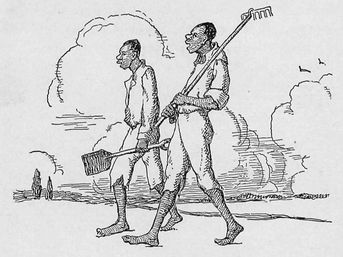
TWO OF THE FARM HANDS
The little town was ready for the President. He was to be met at the village green by an escort of soldiers who would accompany him as he toured the town, and flower girls were to head the procession.
Betsy Brandon was to be one of the flower girls and that was why she had such a pretty new frock. It was made of the sheerest, white dotted swiss with as many ruffles as a white rose has petals. And some of the ruffles were caught up with bunches of tiny pink flowers and green leaves that Betsy’s mother had made with her own clever fingers. A wide pink sash lay on the bed, too, and a white hat with wide pink streamers and a bunch of the same pretty pink flowers in front. Betsy was to wear pink silk stockings and white slippers. Never, in all her life, had she been allowed to wear such lovely things.
She touched the flowing ruffles and the soft silk of the sash, thinking how happy she would be with the other little daughters of Salisbury in the morning. She had not noticed that her mother had crossed the threshold of the spare room and stood beside her looking down earnestly into the little girl’s happy face. Mistress Brandon put her hand on Betsy’s brown braids that were coiled neatly and tied about her head.
“My precious little daughter,” Mistress Brandon said, “there is something that I must tell you.”
“Yes, mother,” Betsy looked smilingly into her mother’s sober face.
Her mother spoke quickly now and as if the words hurt her. “Your dear Aunt Tabitha’s serving man has just come in great haste on horseback from her plantation to say that his mistress is far from well and wishes me to come to her at once with a supply of simples. I must go. The maids are packing my basket and laying out my traveling cloak, and the horses are harnessed and at the door.” She paused, in sorrow at the grief that she saw suddenly in Betsy’s radiant face.
“Your father will not return for some days yet,” she added, and then stopped.
There was a pause and then Betsy looked up bravely, saying just what her mother had hoped and expected that she would, for she was a good little girl.
“And Grandmother should not be left alone here because she is not well and the maids are new,” Betsy said. Then, all at once, it seemed as if she could not bear her disappointment. She threw herself into her mother’s arms, burying her head in her shoulder. “I can’t be a flower girl,” she sobbed. “I must stay at home to-morrow, and not see President Washington. Oh, I can’t bear it; it seems as if I just can’t!”
Her mother stooped down and kissed her. “Any other little daughter except my own brave little Betsy perhaps could not bear the disappointment,” she said, “but she can. The Brandons come of a brave old family, strong to fight and well able to bear whatever comes to them. And think, too, dear, what sorrows came to our brave President before he won the war for us. You can try to be as brave as he, dear child, can you not?”
“Yes, mother.” Betsy was smiling again. She folded the dainty frock and the sash and laid them away in one of the lavender-scented drawers of the big mahogany bureau. And then she went downstairs, and did not shed one tear as she kissed her mother good-bye and watched her drive away between the magnolia trees that lined the long driveway of the plantation.
It was a hard afternoon, though, for Betsy. The little girl who lived on the next plantation came over to see Betsy’s dress and after she had shown it to her, Betsy had to tell her that she would not have an opportunity to wear it. She thought, too, that it would make her grandmother feel badly if she were to know of her disappointment, so she sat with her in her big, sunny room in the afternoon and read to her and was a smiling little girl all the time. Late in the day Betsy went down to the kitchen and made corn bread. She was almost as good a cook as was her mother. The corn bread was as yellow as gold, and as light as sponge cake.
The morning of the great day for Salisbury was as blue and gold as sky and sun could make it. Betsy was up with the birds and gave the maids their orders for the day, and looked over the supplies in the safe, as the big locked cupboard for food was called, just as Mistress Brandon would have done if she had been home. She opened all the windows of the mansion to let in the sweet spring air. She filled the bowls and vases with fresh flowers, and then she sat down with her sewing on the piazza.
Betsy was working a sampler in cross-stitch. Around the edge, embroidered in bright crewels, was a border of flowers and bees, the latter because of her initials. Inside, Betsy was working her name in neat letters, the Lord’s prayer, and the date of her birth. Usually Betsy liked nothing better than to be able to sit there in the quiet of the piazza, shaded by its great pillars, the green lawn stretching below the steps and her colored sewing in her lap. To-day, though, her eyes left the bright worsted often to follow the line of the plantation driveway that led away from the house and down toward the village.
Through the trees she had glimpses of fluttering white skirts and bright ribbons. The flower girls, her little girl neighbors, were gathering and taking their happy way down to the village green to meet Mr. Washington. She could hear their merry voices and the sounds of fifes and drums. The soldiers were starting, too.
Betsy could see, in imagination, how pretty and gay the town would be. People in their carriages and coaches would be there from miles around. Every one would be joyous and so proud to do honor to the Greatest American. It was hours too early for him to be there yet, but here they were gathering to greet him.
“I am brave, but it seems as if I must cry just a little bit,” Betsy buried her head in her sewing. But before she had shed a tear, a man’s voice startled her. She looked up.
He was very tall and straight, and wore the beautiful, rich costume of the Colonies. His velvet knee breeches, silver-buckled shoes, gold-embroidered coat, and white wig showed Betsy that he was a personage of importance. But he stood before her with his three-cornered hat in his hand and bowed to her quite as if she had been a young lady.
“Good morning, little lass of Salisbury,” he said in his deep, kind voice, pointing to her sewing. “You are an industrious child, such an one as I like to see growing up in this new land. You work betimes in the day, and with the birds.”
Betsy rose and dropped a deep curtsey to the stranger. She must have looked very winsome to him in her pink calico dress, white apron, and with her cheeks flushed to a rose color in excitement.
“My mother has taught me that work comes before play, and always in the morning,” Betsy explained. “What is your pleasure, sir!” she went on. “I am the mistress of the Brandon plantation for the day. My mother is called away by the illness of my Aunt Tabitha and I am taking care of grandmother and the maids in her absence. It is a sore disappointment to me, sir. I was to have been a flower girl in the village and walked with our guest of honor of the day, Mr. Washington.”
The stranger came up the steps, and took a chair beside Betsy.
“You wanted very much to see him?” he asked. “Why?”
“Because President Washington is a great soldier, and the most important man in the United States,” Betsy answered, her hands clasped, and her eyes shining with excitement.
The man smiled. “I know him,” he said. “Did it ever occur to you, little lass of Salisbury, that perhaps Mr. Washington is a great deal like other Americans. He loves the earth,” he pointed to the wide expanse of the fertile Brandon acres. “Perhaps, too, he likes to try new roads as I have done this morning. I have come a long distance,” he said, “and am tired and hungry. I left my carriage at the entrance to your plantation, and the driveway looked so pleasant and quiet that I walked along it until I came to your house. May I ask you for food and drink, little Mistress of the Mansion?”
“Indeed, yes, sir!” Betsy sprang toward the door, but with her hand on the latch she turned. “Do you like corn bread, sir,” she asked. “I made some, myself, yesterday afternoon. It is delicious with our fresh milk, half cream.”
“That would make a breakfast that I should like above all else,” the stranger said, smiling. And he watched the graceful little figure as Betsy slipped through the door. “A good daughter of America,” he said to himself, “a housewife above all else.”
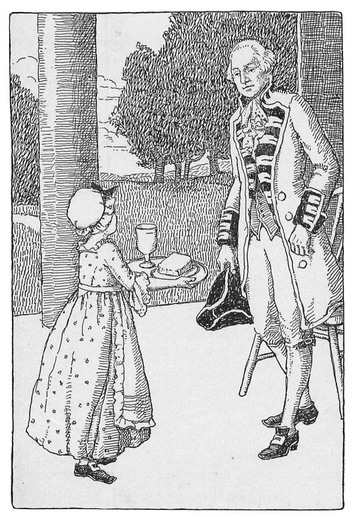
“LITTLE MISTRESS OF THE MANSION”
In the twinkling of an eye, Betsy returned, carrying a daintily-spread tray. On a white cloth there was set gold and white china, thin and sparkling. The corn bread almost matched the gold, and a tall glass goblet was filled to the top with foamy milk. Betsy’s guest ate as if no meal had ever tasted so good to him before. He did not speak until he had eaten the last crumb of the corn bread and drunk the last drop of the milk. Then he rose to go.
“Many thanks, little Mistress of the Mansion,” he said, “for your very gracious hospitality. I have been entertained most lavishly on the journey I am now taking, but at no stopping place have I enjoyed it so much. I want you to be comforted in your disappointment, my child, and to realize that in serving and feeding a stranger you have done quite as kind an act as if you had scattered flowers before your President.”
“Thank you very much, sir!” Betsy bowed again, and took the strong hand the man gave her as he started down the steps. Then a sudden thought came to her.
“May I ask your name, sir?” she asked. “I should like to tell my mother when she returns.”
“You may, my child,” he replied. “It is George Washington.”
PATRIOTIC SONGS
The best Patriotic Songs of the United States and the Allied European Nations.
Arranged for four part singing. Harmonized for use of children in the keys best suited for that purpose. Large type. Size of print page 5×8. Book trimmed to 6×9. Printed on good paper. Strong paper cover. 32 pages. Price, 10 cents.
Contents
America—The Star Spangled Banner—Battle Hymn of the Republic—Columbia, the Gem of the Ocean—Hail Columbia!—The Battle Cry of Freedom—Tramp! Tramp! Tramp! the Boys are Marching—Yankee Doodle—Tenting on the Old Camp Ground—Home, Sweet Home—Onward Christian Soldiers—Dixie—My Old Kentucky Home—Old Black Joe—Old Folks at Home—Illinois—Sweet and Low—Hymn of the Marseillaise—God Save the King—March of the Men of Harlech—Annie Laurie—Auld Lang Syne—When Johnny Comes Marching Home—Swanee River.
SPECIAL QUANTITY PRICES
One Dozen Copies for $1.00 Postpaid
Fifty Copies for 4.00 Postpaid
One Hundred Copies for 7.50 Postpaid
A. Flanagan Company—Chicago
Patriotic Books
AMERICAN HEROES FROM HISTORY
By INEZ N. McFEE
For Fifth, Sixth, and Seventh Grades Cloth—262 pages—Illustrated—76 cents
When the “fairy-tale” period has passed nothing thrills the school boy or girl as do true stories of real heroes. “American Heroes from History” describes the deeds of those men who were instrumental in building our great Nation so entertainingly that the pupils are taught history and patriotism while absorbed in the stories themselves.
PATRIOTIC SONGS
32 large pages—Paper—10 cents
Contains the words and music of twenty-three of the best National songs of America and the Allied countries. There is no better way to teach love for one’s country than by the use of patriotic songs. Printed on good paper and well bound. This book should be in the hands of every boy and girl in the country.
THE MAN WITHOUT A COUNTRY
By EDWARD EVERETT HALE
Cloth, 40 cents—Paper, 20 cents—64 pages
This book has become an American classic—too well known to require comment.
Our edition is an excellent one, with introduction and notes, an account of how the story came to be written, portrait of author, and questions on the text.
How many copies shall we send you?
A. FLANAGAN COMPANY—CHICAGO
End of the Project Gutenberg EBook of Boys and Girls of Colonial Days, by
Carolyn Sherwin Bailey
*** END OF THIS PROJECT GUTENBERG EBOOK BOYS AND GIRLS OF COLONIAL DAYS ***
***** This file should be named 41348-h.htm or 41348-h.zip *****
This and all associated files of various formats will be found in:
http://www.gutenberg.org/4/1/3/4/41348/
Produced by Roger Frank and the Online Distributed
Proofreading Team at http://www.pgdp.net
Updated editions will replace the previous one--the old editions
will be renamed.
Creating the works from public domain print editions means that no
one owns a United States copyright in these works, so the Foundation
(and you!) can copy and distribute it in the United States without
permission and without paying copyright royalties. Special rules,
set forth in the General Terms of Use part of this license, apply to
copying and distributing Project Gutenberg-tm electronic works to
protect the PROJECT GUTENBERG-tm concept and trademark. Project
Gutenberg is a registered trademark, and may not be used if you
charge for the eBooks, unless you receive specific permission. If you
do not charge anything for copies of this eBook, complying with the
rules is very easy. You may use this eBook for nearly any purpose
such as creation of derivative works, reports, performances and
research. They may be modified and printed and given away--you may do
practically ANYTHING with public domain eBooks. Redistribution is
subject to the trademark license, especially commercial
redistribution.
*** START: FULL LICENSE ***
THE FULL PROJECT GUTENBERG LICENSE
PLEASE READ THIS BEFORE YOU DISTRIBUTE OR USE THIS WORK
To protect the Project Gutenberg-tm mission of promoting the free
distribution of electronic works, by using or distributing this work
(or any other work associated in any way with the phrase "Project
Gutenberg"), you agree to comply with all the terms of the Full Project
Gutenberg-tm License available with this file or online at
www.gutenberg.org/license.
Section 1. General Terms of Use and Redistributing Project Gutenberg-tm
electronic works
1.A. By reading or using any part of this Project Gutenberg-tm
electronic work, you indicate that you have read, understand, agree to
and accept all the terms of this license and intellectual property
(trademark/copyright) agreement. If you do not agree to abide by all
the terms of this agreement, you must cease using and return or destroy
all copies of Project Gutenberg-tm electronic works in your possession.
If you paid a fee for obtaining a copy of or access to a Project
Gutenberg-tm electronic work and you do not agree to be bound by the
terms of this agreement, you may obtain a refund from the person or
entity to whom you paid the fee as set forth in paragraph 1.E.8.
1.B. "Project Gutenberg" is a registered trademark. It may only be
used on or associated in any way with an electronic work by people who
agree to be bound by the terms of this agreement. There are a few
things that you can do with most Project Gutenberg-tm electronic works
even without complying with the full terms of this agreement. See
paragraph 1.C below. There are a lot of things you can do with Project
Gutenberg-tm electronic works if you follow the terms of this agreement
and help preserve free future access to Project Gutenberg-tm electronic
works. See paragraph 1.E below.
1.C. The Project Gutenberg Literary Archive Foundation ("the Foundation"
or PGLAF), owns a compilation copyright in the collection of Project
Gutenberg-tm electronic works. Nearly all the individual works in the
collection are in the public domain in the United States. If an
individual work is in the public domain in the United States and you are
located in the United States, we do not claim a right to prevent you from
copying, distributing, performing, displaying or creating derivative
works based on the work as long as all references to Project Gutenberg
are removed. Of course, we hope that you will support the Project
Gutenberg-tm mission of promoting free access to electronic works by
freely sharing Project Gutenberg-tm works in compliance with the terms of
this agreement for keeping the Project Gutenberg-tm name associated with
the work. You can easily comply with the terms of this agreement by
keeping this work in the same format with its attached full Project
Gutenberg-tm License when you share it without charge with others.
1.D. The copyright laws of the place where you are located also govern
what you can do with this work. Copyright laws in most countries are in
a constant state of change. If you are outside the United States, check
the laws of your country in addition to the terms of this agreement
before downloading, copying, displaying, performing, distributing or
creating derivative works based on this work or any other Project
Gutenberg-tm work. The Foundation makes no representations concerning
the copyright status of any work in any country outside the United
States.
1.E. Unless you have removed all references to Project Gutenberg:
1.E.1. The following sentence, with active links to, or other immediate
access to, the full Project Gutenberg-tm License must appear prominently
whenever any copy of a Project Gutenberg-tm work (any work on which the
phrase "Project Gutenberg" appears, or with which the phrase "Project
Gutenberg" is associated) is accessed, displayed, performed, viewed,
copied or distributed:
This eBook is for the use of anyone anywhere at no cost and with
almost no restrictions whatsoever. You may copy it, give it away or
re-use it under the terms of the Project Gutenberg License included
with this eBook or online at www.gutenberg.org
1.E.2. If an individual Project Gutenberg-tm electronic work is derived
from the public domain (does not contain a notice indicating that it is
posted with permission of the copyright holder), the work can be copied
and distributed to anyone in the United States without paying any fees
or charges. If you are redistributing or providing access to a work
with the phrase "Project Gutenberg" associated with or appearing on the
work, you must comply either with the requirements of paragraphs 1.E.1
through 1.E.7 or obtain permission for the use of the work and the
Project Gutenberg-tm trademark as set forth in paragraphs 1.E.8 or
1.E.9.
1.E.3. If an individual Project Gutenberg-tm electronic work is posted
with the permission of the copyright holder, your use and distribution
must comply with both paragraphs 1.E.1 through 1.E.7 and any additional
terms imposed by the copyright holder. Additional terms will be linked
to the Project Gutenberg-tm License for all works posted with the
permission of the copyright holder found at the beginning of this work.
1.E.4. Do not unlink or detach or remove the full Project Gutenberg-tm
License terms from this work, or any files containing a part of this
work or any other work associated with Project Gutenberg-tm.
1.E.5. Do not copy, display, perform, distribute or redistribute this
electronic work, or any part of this electronic work, without
prominently displaying the sentence set forth in paragraph 1.E.1 with
active links or immediate access to the full terms of the Project
Gutenberg-tm License.
1.E.6. You may convert to and distribute this work in any binary,
compressed, marked up, nonproprietary or proprietary form, including any
word processing or hypertext form. However, if you provide access to or
distribute copies of a Project Gutenberg-tm work in a format other than
"Plain Vanilla ASCII" or other format used in the official version
posted on the official Project Gutenberg-tm web site (www.gutenberg.org),
you must, at no additional cost, fee or expense to the user, provide a
copy, a means of exporting a copy, or a means of obtaining a copy upon
request, of the work in its original "Plain Vanilla ASCII" or other
form. Any alternate format must include the full Project Gutenberg-tm
License as specified in paragraph 1.E.1.
1.E.7. Do not charge a fee for access to, viewing, displaying,
performing, copying or distributing any Project Gutenberg-tm works
unless you comply with paragraph 1.E.8 or 1.E.9.
1.E.8. You may charge a reasonable fee for copies of or providing
access to or distributing Project Gutenberg-tm electronic works provided
that
- You pay a royalty fee of 20% of the gross profits you derive from
the use of Project Gutenberg-tm works calculated using the method
you already use to calculate your applicable taxes. The fee is
owed to the owner of the Project Gutenberg-tm trademark, but he
has agreed to donate royalties under this paragraph to the
Project Gutenberg Literary Archive Foundation. Royalty payments
must be paid within 60 days following each date on which you
prepare (or are legally required to prepare) your periodic tax
returns. Royalty payments should be clearly marked as such and
sent to the Project Gutenberg Literary Archive Foundation at the
address specified in Section 4, "Information about donations to
the Project Gutenberg Literary Archive Foundation."
- You provide a full refund of any money paid by a user who notifies
you in writing (or by e-mail) within 30 days of receipt that s/he
does not agree to the terms of the full Project Gutenberg-tm
License. You must require such a user to return or
destroy all copies of the works possessed in a physical medium
and discontinue all use of and all access to other copies of
Project Gutenberg-tm works.
- You provide, in accordance with paragraph 1.F.3, a full refund of any
money paid for a work or a replacement copy, if a defect in the
electronic work is discovered and reported to you within 90 days
of receipt of the work.
- You comply with all other terms of this agreement for free
distribution of Project Gutenberg-tm works.
1.E.9. If you wish to charge a fee or distribute a Project Gutenberg-tm
electronic work or group of works on different terms than are set
forth in this agreement, you must obtain permission in writing from
both the Project Gutenberg Literary Archive Foundation and Michael
Hart, the owner of the Project Gutenberg-tm trademark. Contact the
Foundation as set forth in Section 3 below.
1.F.
1.F.1. Project Gutenberg volunteers and employees expend considerable
effort to identify, do copyright research on, transcribe and proofread
public domain works in creating the Project Gutenberg-tm
collection. Despite these efforts, Project Gutenberg-tm electronic
works, and the medium on which they may be stored, may contain
"Defects," such as, but not limited to, incomplete, inaccurate or
corrupt data, transcription errors, a copyright or other intellectual
property infringement, a defective or damaged disk or other medium, a
computer virus, or computer codes that damage or cannot be read by
your equipment.
1.F.2. LIMITED WARRANTY, DISCLAIMER OF DAMAGES - Except for the "Right
of Replacement or Refund" described in paragraph 1.F.3, the Project
Gutenberg Literary Archive Foundation, the owner of the Project
Gutenberg-tm trademark, and any other party distributing a Project
Gutenberg-tm electronic work under this agreement, disclaim all
liability to you for damages, costs and expenses, including legal
fees. YOU AGREE THAT YOU HAVE NO REMEDIES FOR NEGLIGENCE, STRICT
LIABILITY, BREACH OF WARRANTY OR BREACH OF CONTRACT EXCEPT THOSE
PROVIDED IN PARAGRAPH 1.F.3. YOU AGREE THAT THE FOUNDATION, THE
TRADEMARK OWNER, AND ANY DISTRIBUTOR UNDER THIS AGREEMENT WILL NOT BE
LIABLE TO YOU FOR ACTUAL, DIRECT, INDIRECT, CONSEQUENTIAL, PUNITIVE OR
INCIDENTAL DAMAGES EVEN IF YOU GIVE NOTICE OF THE POSSIBILITY OF SUCH
DAMAGE.
1.F.3. LIMITED RIGHT OF REPLACEMENT OR REFUND - If you discover a
defect in this electronic work within 90 days of receiving it, you can
receive a refund of the money (if any) you paid for it by sending a
written explanation to the person you received the work from. If you
received the work on a physical medium, you must return the medium with
your written explanation. The person or entity that provided you with
the defective work may elect to provide a replacement copy in lieu of a
refund. If you received the work electronically, the person or entity
providing it to you may choose to give you a second opportunity to
receive the work electronically in lieu of a refund. If the second copy
is also defective, you may demand a refund in writing without further
opportunities to fix the problem.
1.F.4. Except for the limited right of replacement or refund set forth
in paragraph 1.F.3, this work is provided to you 'AS-IS', WITH NO OTHER
WARRANTIES OF ANY KIND, EXPRESS OR IMPLIED, INCLUDING BUT NOT LIMITED TO
WARRANTIES OF MERCHANTABILITY OR FITNESS FOR ANY PURPOSE.
1.F.5. Some states do not allow disclaimers of certain implied
warranties or the exclusion or limitation of certain types of damages.
If any disclaimer or limitation set forth in this agreement violates the
law of the state applicable to this agreement, the agreement shall be
interpreted to make the maximum disclaimer or limitation permitted by
the applicable state law. The invalidity or unenforceability of any
provision of this agreement shall not void the remaining provisions.
1.F.6. INDEMNITY - You agree to indemnify and hold the Foundation, the
trademark owner, any agent or employee of the Foundation, anyone
providing copies of Project Gutenberg-tm electronic works in accordance
with this agreement, and any volunteers associated with the production,
promotion and distribution of Project Gutenberg-tm electronic works,
harmless from all liability, costs and expenses, including legal fees,
that arise directly or indirectly from any of the following which you do
or cause to occur: (a) distribution of this or any Project Gutenberg-tm
work, (b) alteration, modification, or additions or deletions to any
Project Gutenberg-tm work, and (c) any Defect you cause.
Section 2. Information about the Mission of Project Gutenberg-tm
Project Gutenberg-tm is synonymous with the free distribution of
electronic works in formats readable by the widest variety of computers
including obsolete, old, middle-aged and new computers. It exists
because of the efforts of hundreds of volunteers and donations from
people in all walks of life.
Volunteers and financial support to provide volunteers with the
assistance they need are critical to reaching Project Gutenberg-tm's
goals and ensuring that the Project Gutenberg-tm collection will
remain freely available for generations to come. In 2001, the Project
Gutenberg Literary Archive Foundation was created to provide a secure
and permanent future for Project Gutenberg-tm and future generations.
To learn more about the Project Gutenberg Literary Archive Foundation
and how your efforts and donations can help, see Sections 3 and 4
and the Foundation information page at www.gutenberg.org
Section 3. Information about the Project Gutenberg Literary Archive
Foundation
The Project Gutenberg Literary Archive Foundation is a non profit
501(c)(3) educational corporation organized under the laws of the
state of Mississippi and granted tax exempt status by the Internal
Revenue Service. The Foundation's EIN or federal tax identification
number is 64-6221541. Contributions to the Project Gutenberg
Literary Archive Foundation are tax deductible to the full extent
permitted by U.S. federal laws and your state's laws.
The Foundation's principal office is located at 4557 Melan Dr. S.
Fairbanks, AK, 99712., but its volunteers and employees are scattered
throughout numerous locations. Its business office is located at 809
North 1500 West, Salt Lake City, UT 84116, (801) 596-1887. Email
contact links and up to date contact information can be found at the
Foundation's web site and official page at www.gutenberg.org/contact
For additional contact information:
Dr. Gregory B. Newby
Chief Executive and Director
gbnewby@pglaf.org
Section 4. Information about Donations to the Project Gutenberg
Literary Archive Foundation
Project Gutenberg-tm depends upon and cannot survive without wide
spread public support and donations to carry out its mission of
increasing the number of public domain and licensed works that can be
freely distributed in machine readable form accessible by the widest
array of equipment including outdated equipment. Many small donations
($1 to $5,000) are particularly important to maintaining tax exempt
status with the IRS.
The Foundation is committed to complying with the laws regulating
charities and charitable donations in all 50 states of the United
States. Compliance requirements are not uniform and it takes a
considerable effort, much paperwork and many fees to meet and keep up
with these requirements. We do not solicit donations in locations
where we have not received written confirmation of compliance. To
SEND DONATIONS or determine the status of compliance for any
particular state visit www.gutenberg.org/donate
While we cannot and do not solicit contributions from states where we
have not met the solicitation requirements, we know of no prohibition
against accepting unsolicited donations from donors in such states who
approach us with offers to donate.
International donations are gratefully accepted, but we cannot make
any statements concerning tax treatment of donations received from
outside the United States. U.S. laws alone swamp our small staff.
Please check the Project Gutenberg Web pages for current donation
methods and addresses. Donations are accepted in a number of other
ways including checks, online payments and credit card donations.
To donate, please visit: www.gutenberg.org/donate
Section 5. General Information About Project Gutenberg-tm electronic
works.
Professor Michael S. Hart was the originator of the Project Gutenberg-tm
concept of a library of electronic works that could be freely shared
with anyone. For forty years, he produced and distributed Project
Gutenberg-tm eBooks with only a loose network of volunteer support.
Project Gutenberg-tm eBooks are often created from several printed
editions, all of which are confirmed as Public Domain in the U.S.
unless a copyright notice is included. Thus, we do not necessarily
keep eBooks in compliance with any particular paper edition.
Most people start at our Web site which has the main PG search facility:
www.gutenberg.org
This Web site includes information about Project Gutenberg-tm,
including how to make donations to the Project Gutenberg Literary
Archive Foundation, how to help produce our new eBooks, and how to
subscribe to our email newsletter to hear about new eBooks.